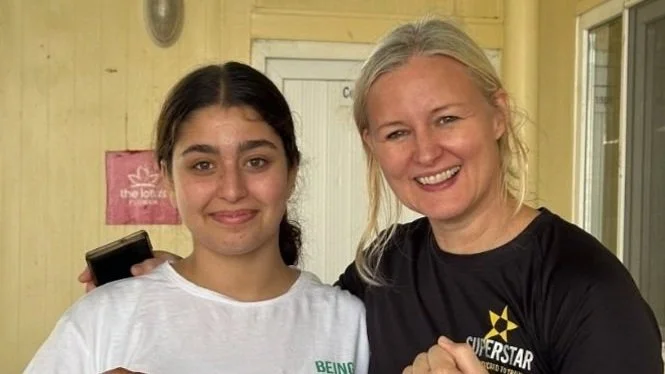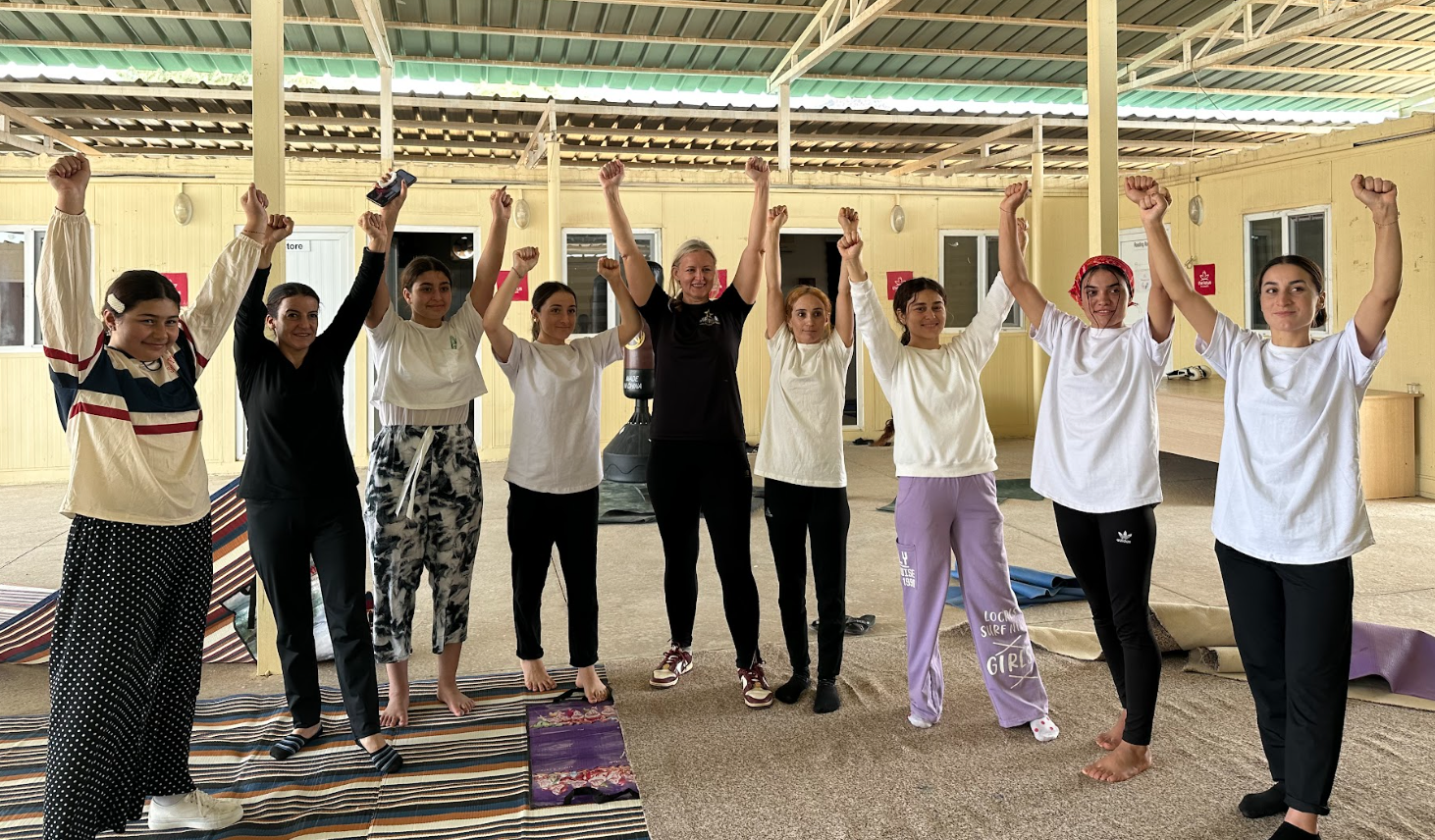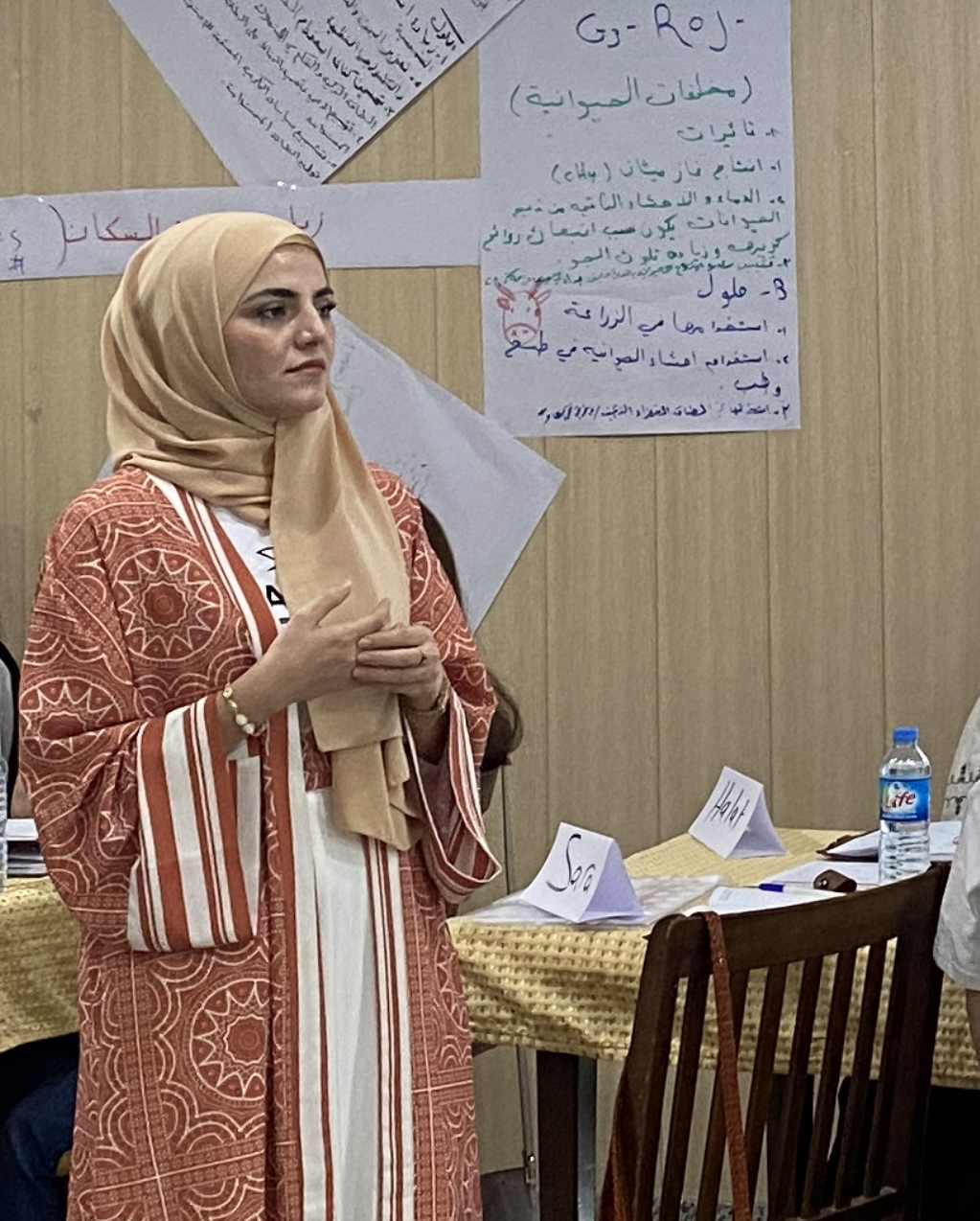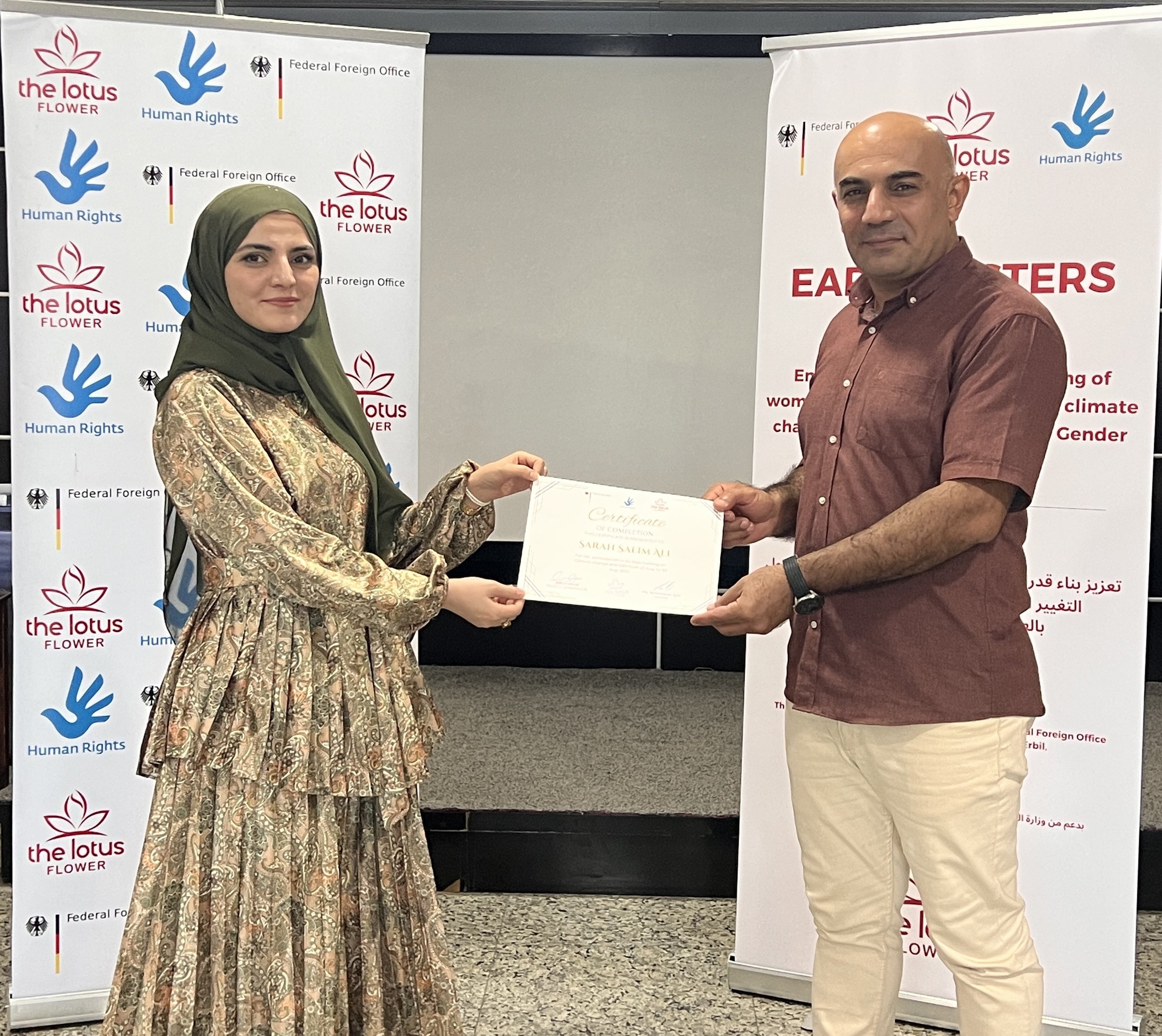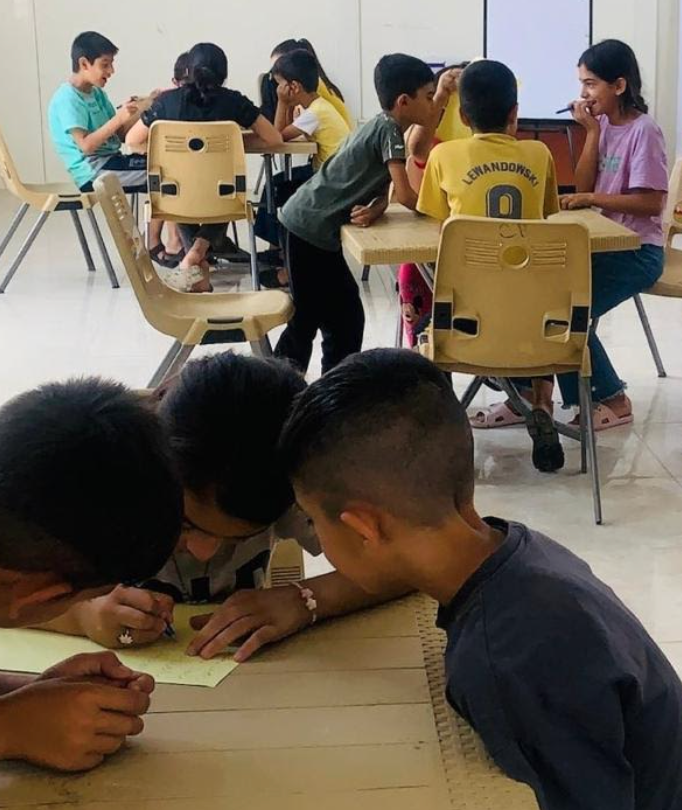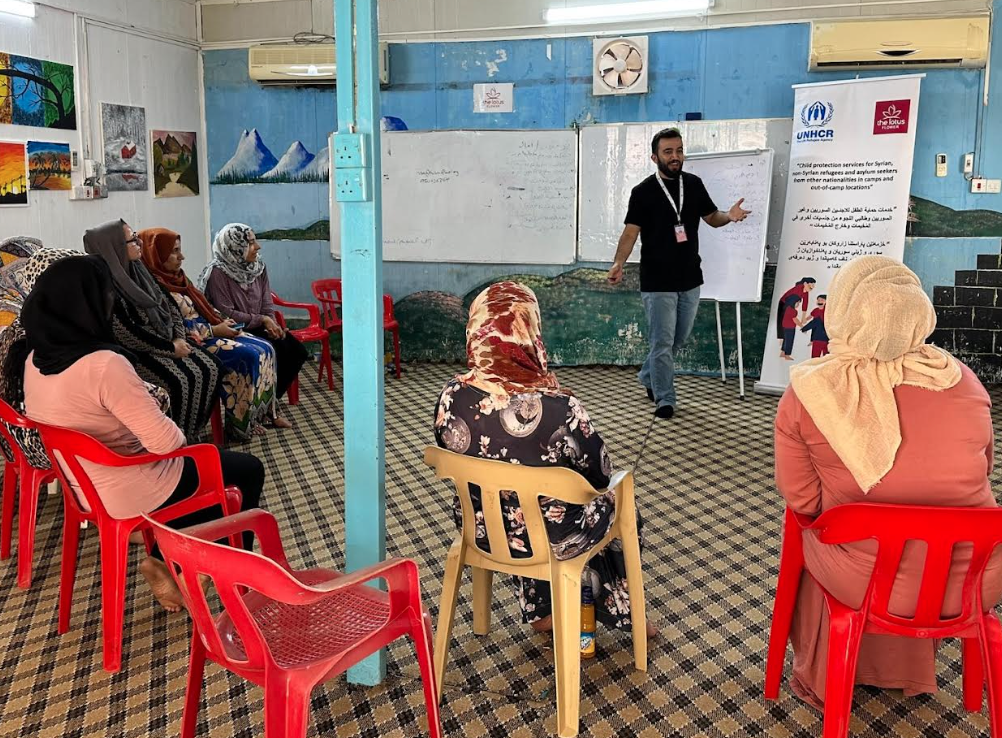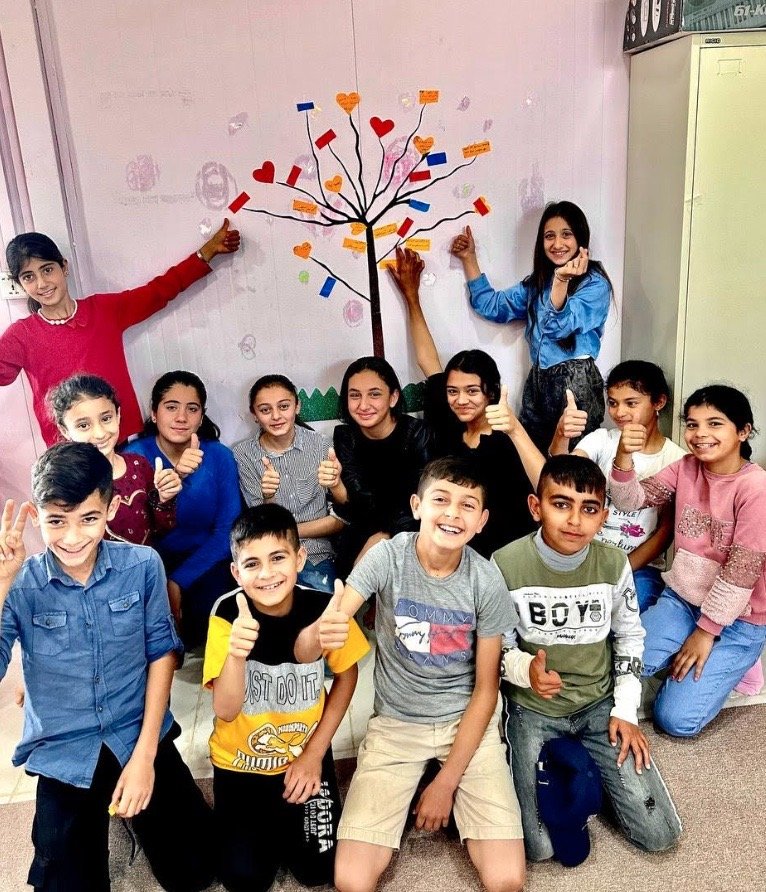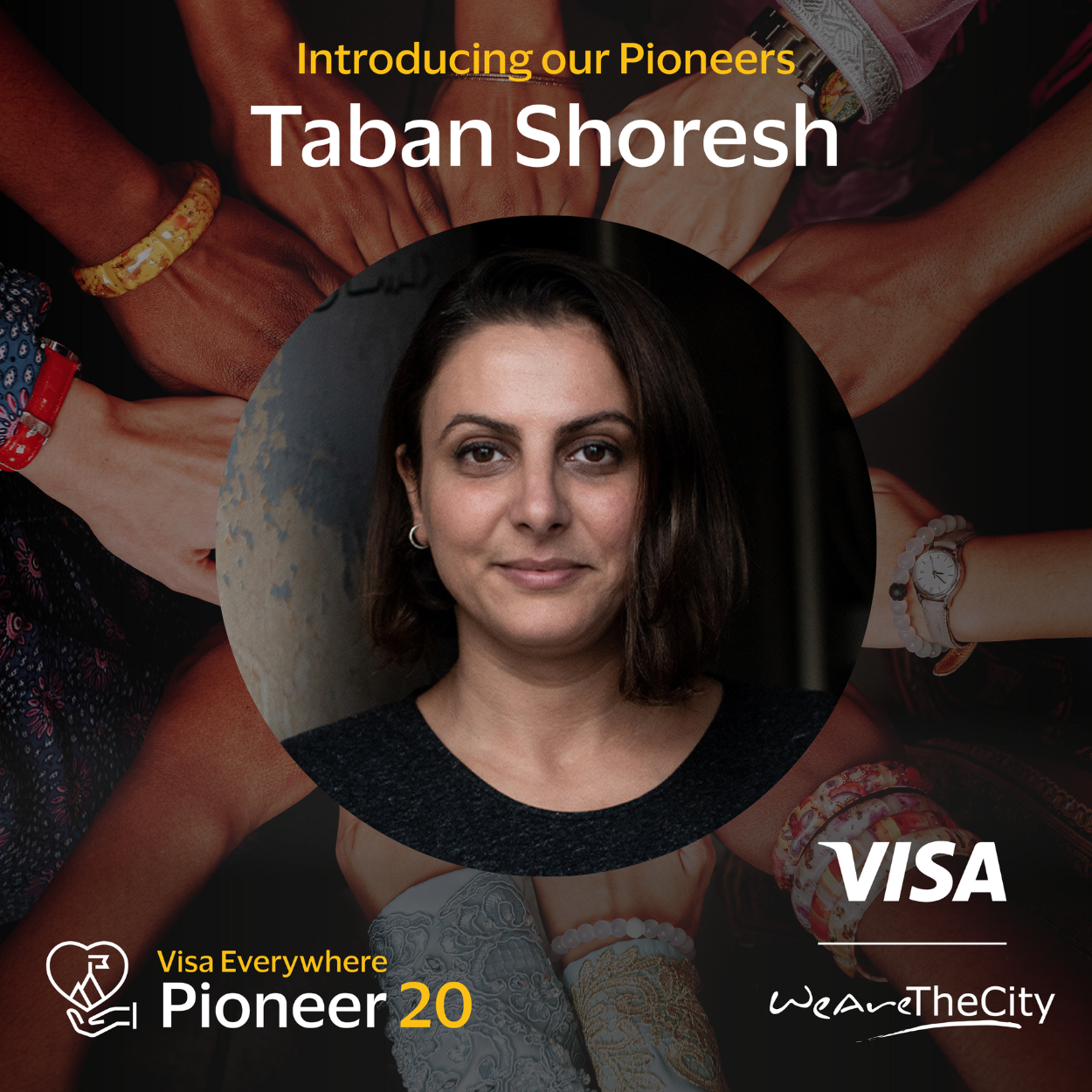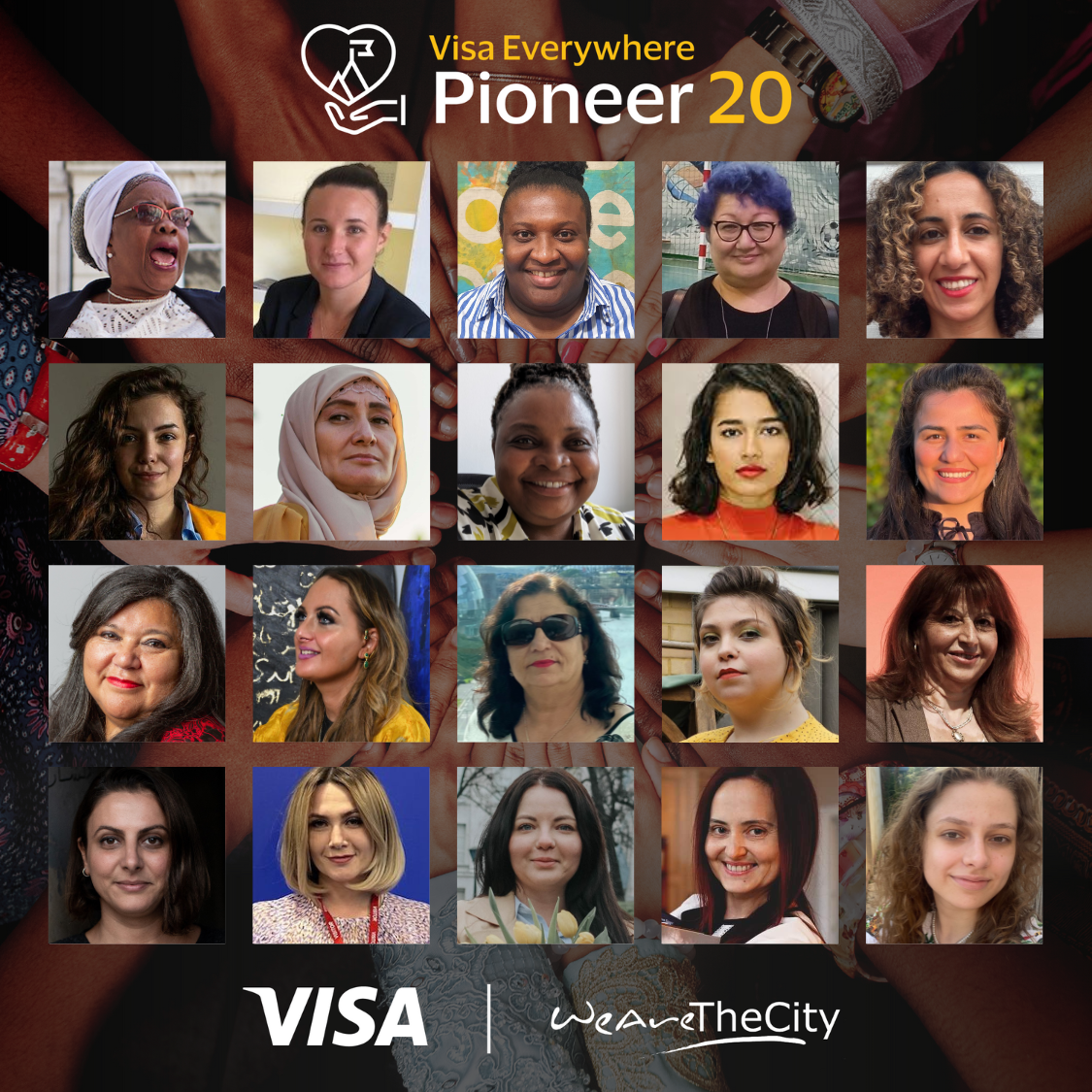Sisters' Stories: How our power girls gym is helping Rosa recover from surgery
Rosa is one of the beneficiaries of our Power Girls Gym, our in-camp facility where women and girls can now exercise in a safe and welcoming environment.
Rosa is 22 and originally from Sinjar, but displacement during the ISIS conflict when she was just a young girl forced her and her family to flee to safety in the mountains. “We were without food, water or any supplies for eight days, and had only the clothes on our backs,” she recalls.
“During the day, we were exposed to the scorching sun, and at night, the weather was extremely cold. We were terrified that ISIS would find us, and lived in constant fear of being killed or harmed. It was a terrible time.”
Rosa and her family ended up living at Essyan camp - where life was far from easy. “It was incredibly challenging,” she adds. “It was the first time I had seen a refugee camp, and I would look at our nylon tent and wonder, ‘How will this protect us from the cold, the heat, or fire?’ But to this day, we continue to live inside it.”
As part of a large family, Rosa’s father could not earn enough to support them, so she had to find work, despite her young age. She began working as a potato farmer, but in 2021 suffered a life-changing injury. “On our way to the camp, our car was involved in an accident, and I broke my leg,” says Rosa. “I had to undergo surgery, and my doctor recommended that I engage in physical activity to regain proper movement in my leg. Unfortunately, there was no gym in the camp, so it was very hard to do this.”
Earlier this year, thanks to kind support from Care Iraq, we opened our Power Girls Gym in the camp, and it has helped Rosa hugely. “I started going there every day to exercise, and now, I can move my leg again. I'm thankful to the Lotus Flower for providing this facility, which I so desperately needed.”
The gym is well equipped with a treadmill, exercise bike and elliptical trainer, plus weights, kettlebells, benches and mats, resistance bands and step platforms. There also lockers for participants to store their belongings safely.
Many other women and girls who use the gym have never had the opportunity to work out before due to strict patriarchal customs and traditions, but now they can meet friends and exercise together at their own pace. Not only is keeping fit vital for physical health, but also for mental wellbeing, and we’re so glad to be able to provide this essential service…
Our Comms Assistant wins award for short film about a young displaced woman
We always love sharing news of our staff’s personal achievements, and we’re so proud of our Comms Assistant Hidar, who recently won fourth place at the ‘Through Her Lens’ film festival in Erbil.
The festival was part of Cordaid’s Women Voices First initiative, in which a group of 15 comms experts, freelancers, directors and activists took part in a storytelling and visual communications training course in Lebanon.
As part of the programme, each participant was then required to make a short documentary, and Hidar decided to focus on a young displaced woman called Bushra – one of more than 60,000 people who have been supported by the Lotus Flower. Through one of our livelihoods projects, she was selected to receive a grant to start her own business, but in the end had to decline the opportunity so she could instead complete her academic studies.
Hidar’s powerful film is called ‘Against All Odds,’ and tells the story of Bushra’s many challenges in life. Not only was she displaced during the ISIS attacks, but she also has dwarfism and has experienced severe bullying and ostracization in the community through the years.
Speaking about Bushra and what he learned while working alongside her, Hidar says: “She is unique, and was the first person in her village and school with dwarfism. Through my film, I wanted to highlight the story of an IDP with special needs, who has suffered from being ‘odd’ in her community.”
As you will see in the film below, Bushra speaks incredibly bravely about her past ordeals, and Hidar adds: “She once even heard people asking her mother to abandon her at Mount Sinjar when they were fleeing ISIS, because they thought she was too small to survive. Back then, she was 10 years-old and when she climbed the mountain, she was holding a bottle of water that was bigger than her.”
Hidar, right, receives his award
Reflecting on his own motivations that helped him shape the film, Hidar says: “I am personally inspired by the dedicated Lotus Flower team. Their support made all of this possible.”
Well done Hidar – and Bushra – for bringing such a beautiful piece of filmmaking to our screens…
You can watch it below…
Sisters' Stories: Meet our Earth Sister Vaman
Our Earth Sisters have been doing an incredible job in raising community awareness of climate change and implementing their own environmental initiatives recently, and here we’d like to share the story of one of the participants.
Vaman is 28 and lives in Duhok city with her parents. After growing up in Iran due to the unstable security situation in Kurdistan, she went on to graduate in Physics from the University of Duhok’s College of Science. She has also volunteered and worked in different humanitarian fields, and served as a teacher for six months too.
Before starting her working life, Vaman says she had little self-confidence. “I had a shy personality and never expressed my feelings clearly,” she says. “I also did not have confidence in my abilities. But after engaging in work life, I discovered my strengths and this was the beginning of my journey of self-development. I wanted to be an active member in society, to be engaged and improve my weaker points – especially in communication skills.”
Vaman was accordingly very keen to sign up for our Earth Sisters project earlier this year, which is supported by the German Consulate in Erbil. She adds: “I believe women and girls must have active roles and participate in this kind of training so they can become more educated and leave their fingerprints in changing the world for the better.”
During the course of the project, she found the leadership training especially helpful, as it taught her how to deliver messages more scientifically and logically. “The training was very beneficial for me both practically and psychologically,” she says. “I can now apply the methods in other areas of my life and share them. For instance, I have a six-year-old cousin and I am teaching him what I have learned, and how he can be a leader even at his young age.”
Vaman now plans to share her newfound skills with other young people who can help make a difference in society by holding conferences on leadership and producing a short film on her experiences of the programme.
As we reported in a recent blog, Vaman and her fellow Earth Sisters have been busy implementing their own climate-related initiatives in recent weeks, including a clean-up of blocked sewers and drains in Baroshke.
They also gave trees to new mothers for planting in their gardens to improve air quality, and helped install an irrigation system at Duhok University for watering newly-planted trees. Art projects were also unveiled in school and university settings to promote climate change action, and a ‘Safe Water’ initiative saw young children provided with environmentally friendly reusable water bottles.
We’re so proud of Vaman and all the Earth Sisters for their achievements so far…
Our Earth Sisters launch their community climate change initiatives
Our Earth Sisters have been putting their recent training to great use, by starting a series of local initiatives around climate change which are geared towards helping the community prevent and reduce environmental harm.
Having come up with the activities themselves, they have begun taking place in and around Duhok, while helping raise awareness of gender injustice, women’s rights and the critical role women and girls can play in climate change mitigations.
You can see the initiatives in the image galleries below, which include:
· Unstoppable Innovators: This activity involved the cleaning of sewers in Baroshke, which aims to prevent future flooding caused by heavy rain. It included clearing piles of harmful rubbish from drains so that run-off rainwater can flow more freely. There were also awareness-raising visits covering environmental protection in schools, as well as with local residents and shop owners.
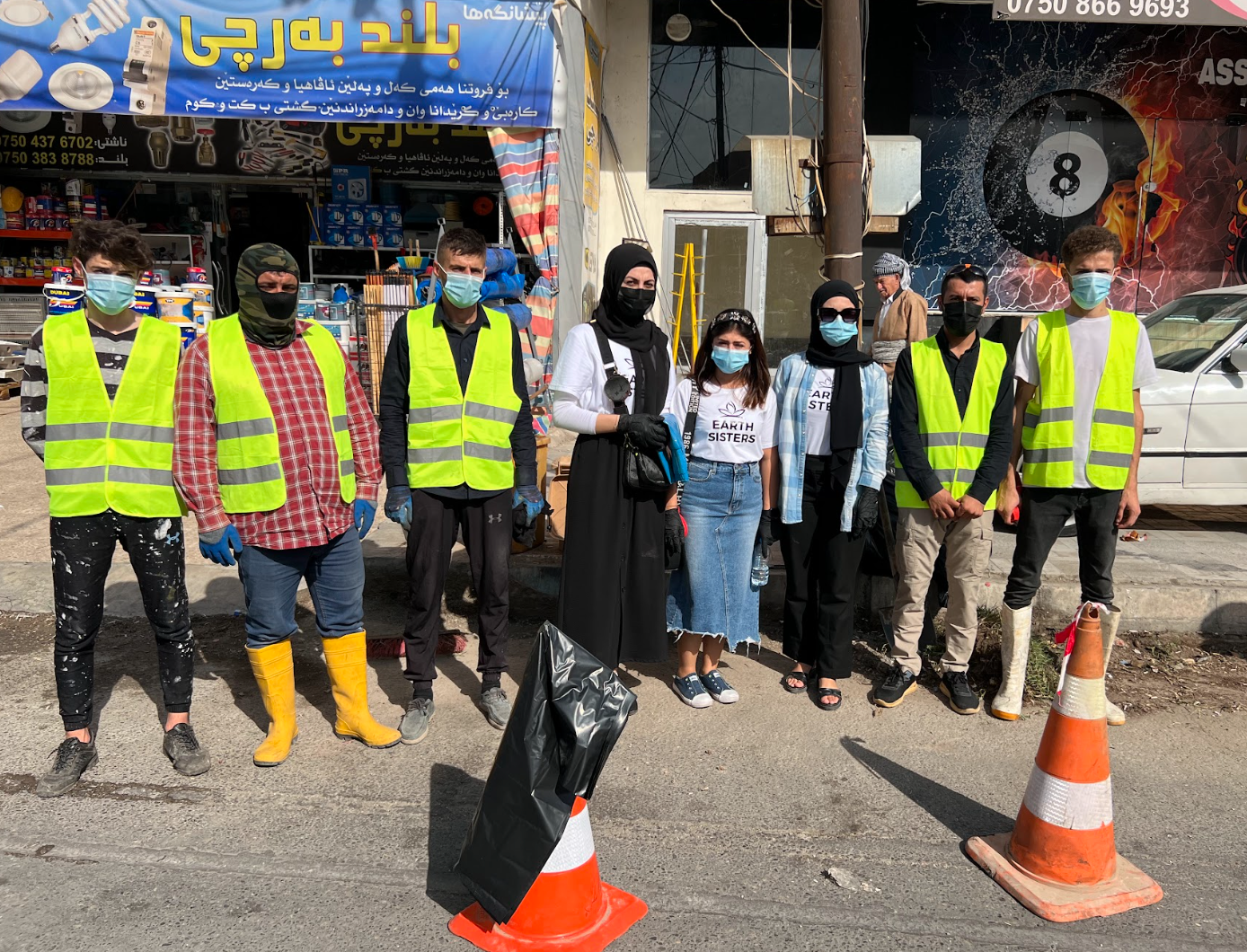
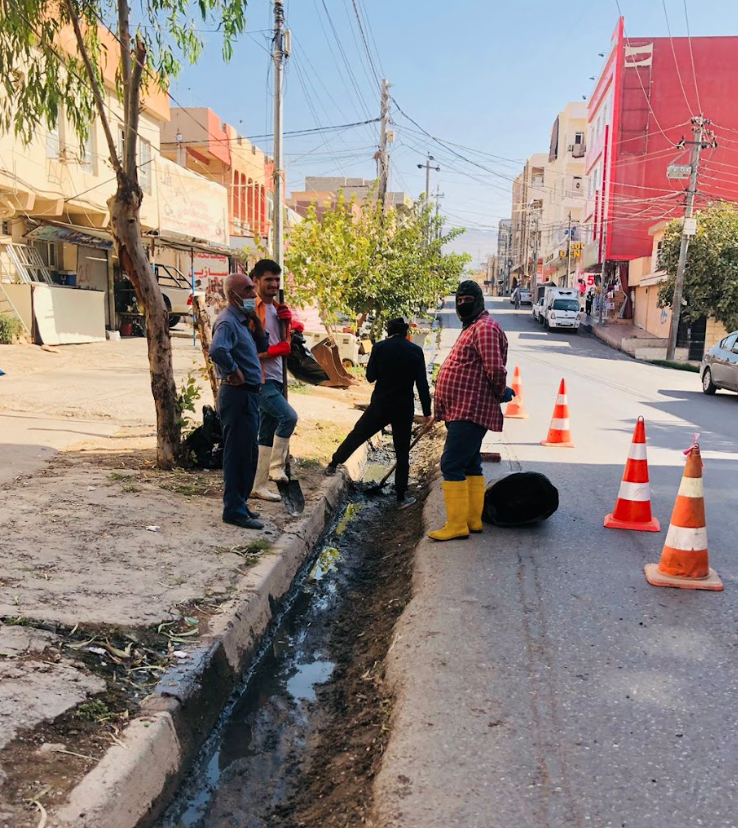
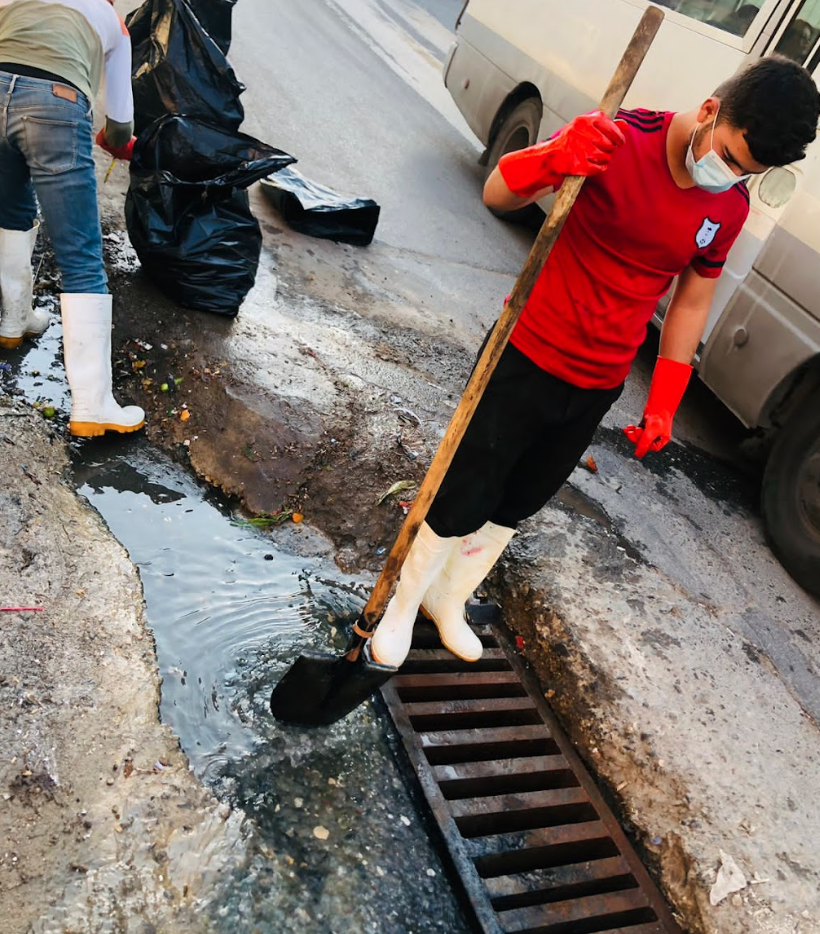
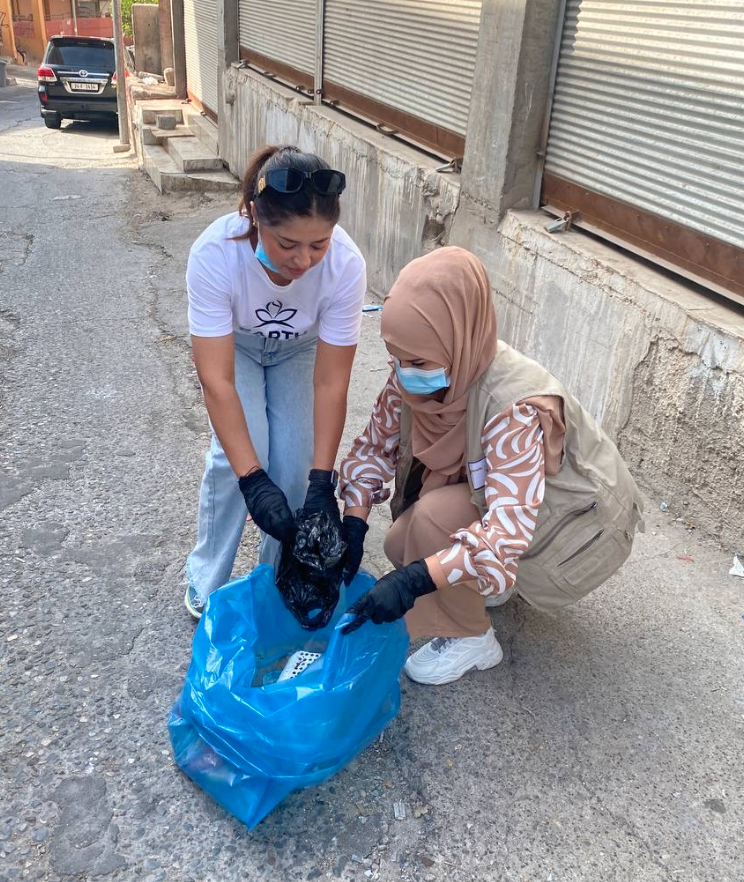
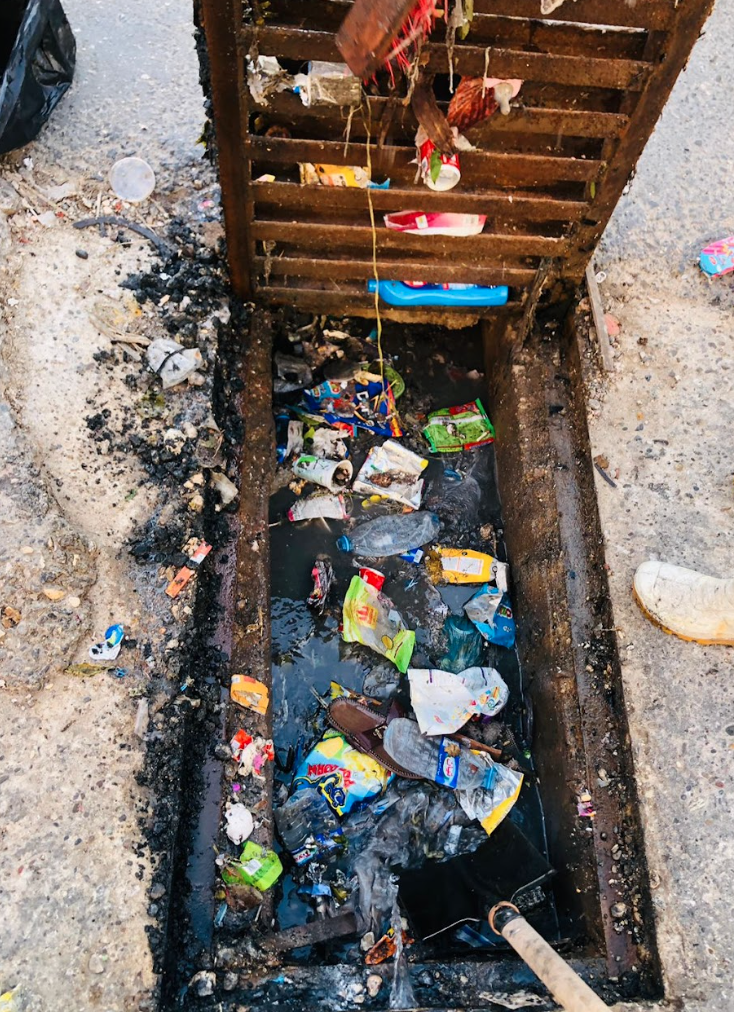
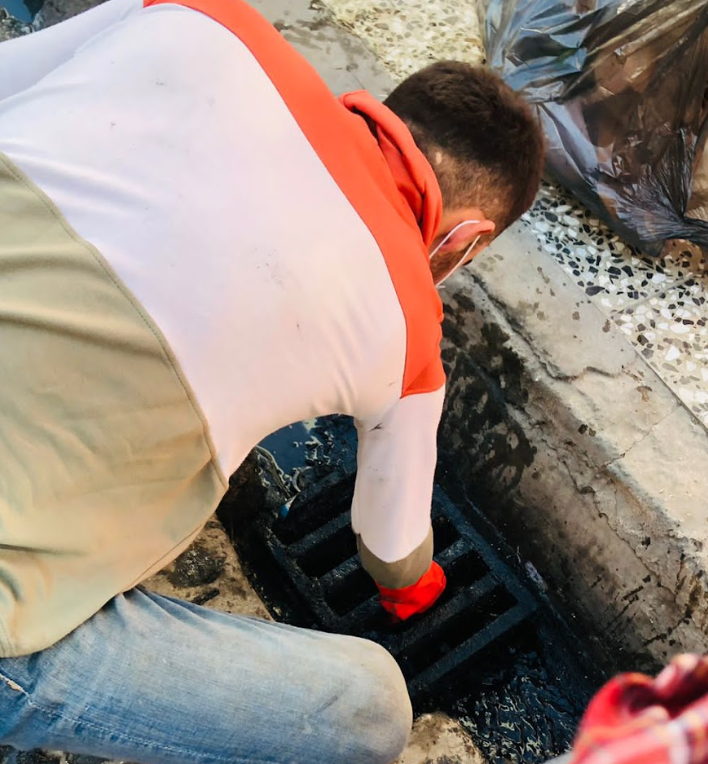
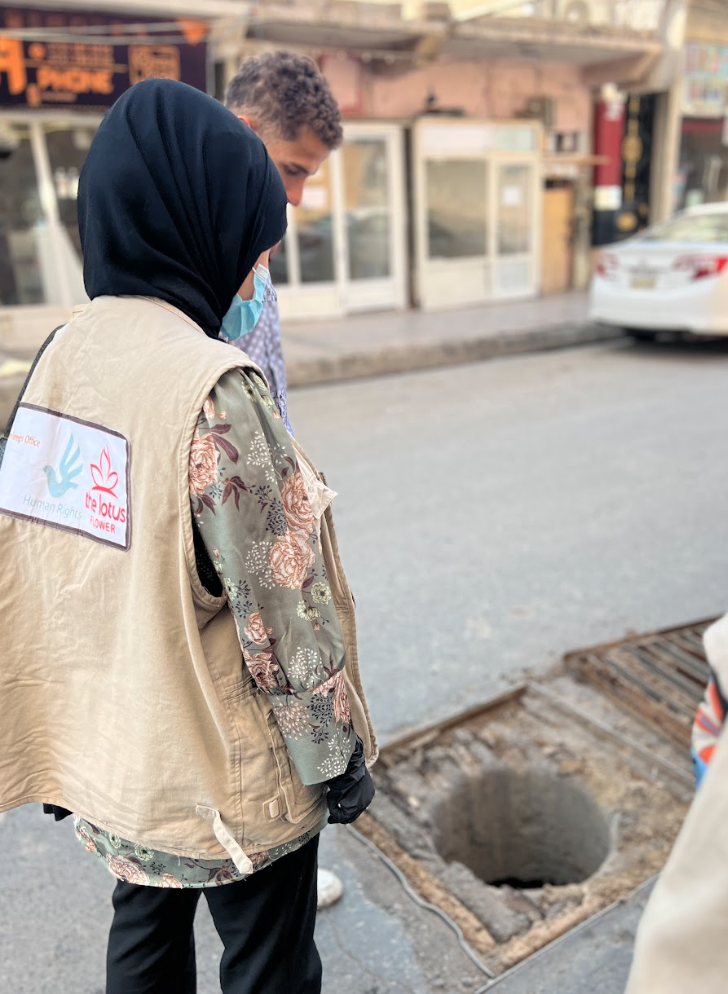
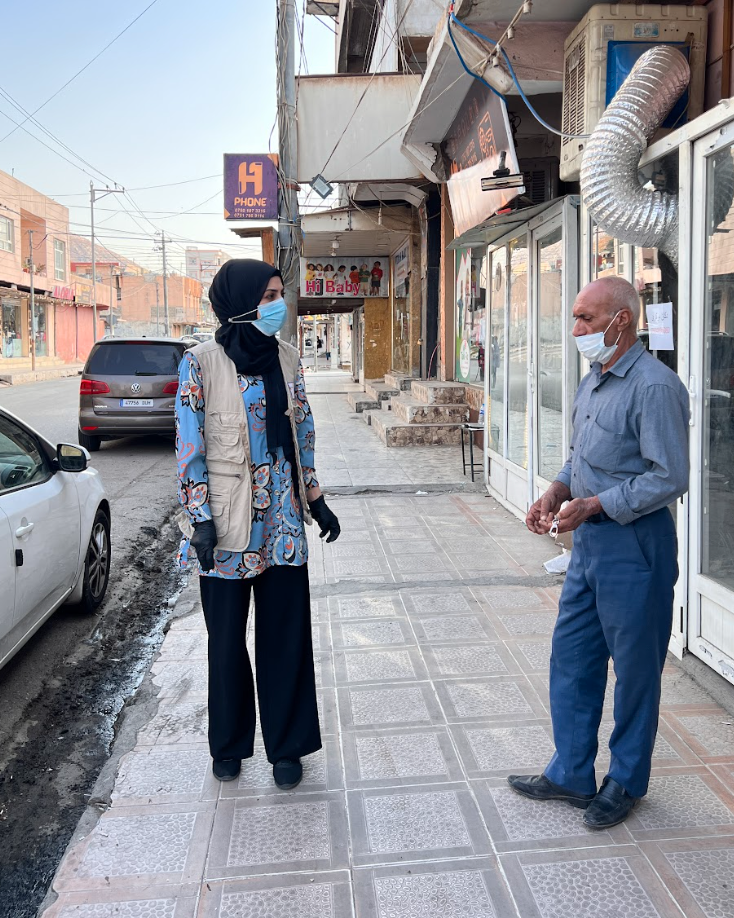
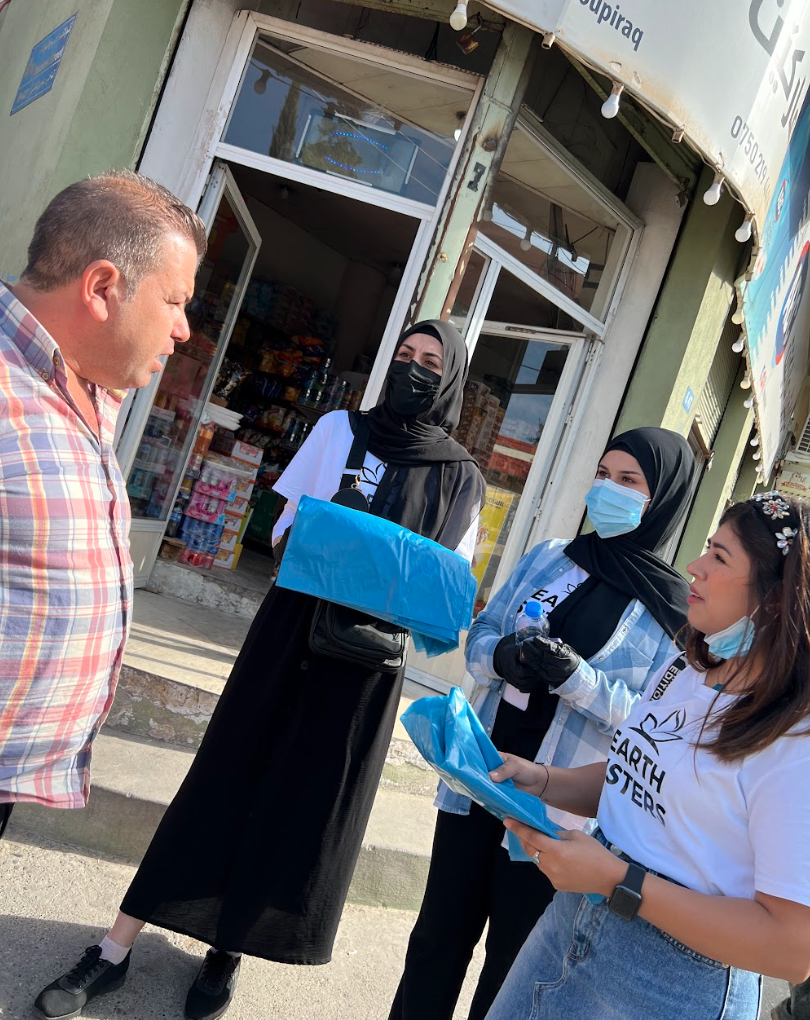
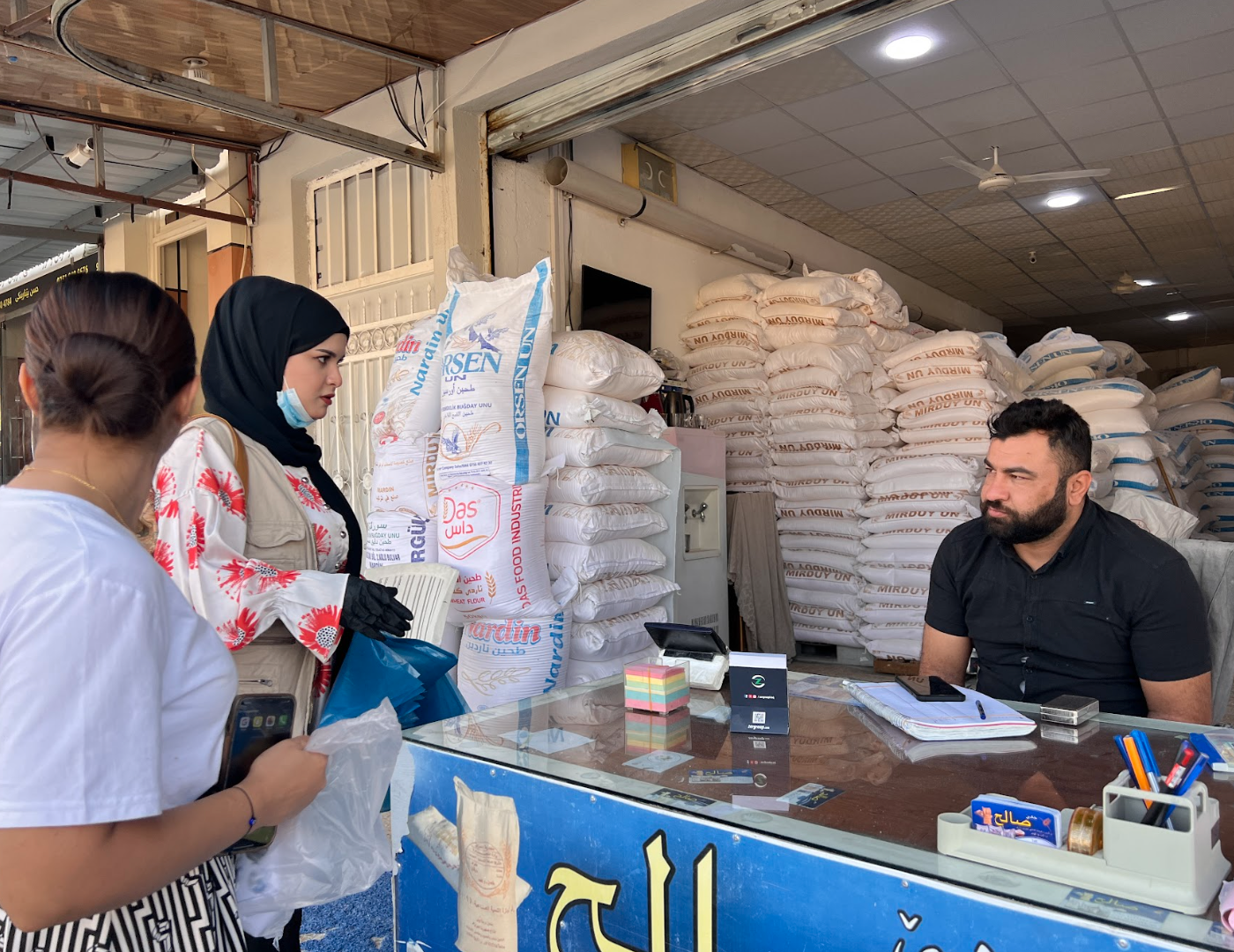
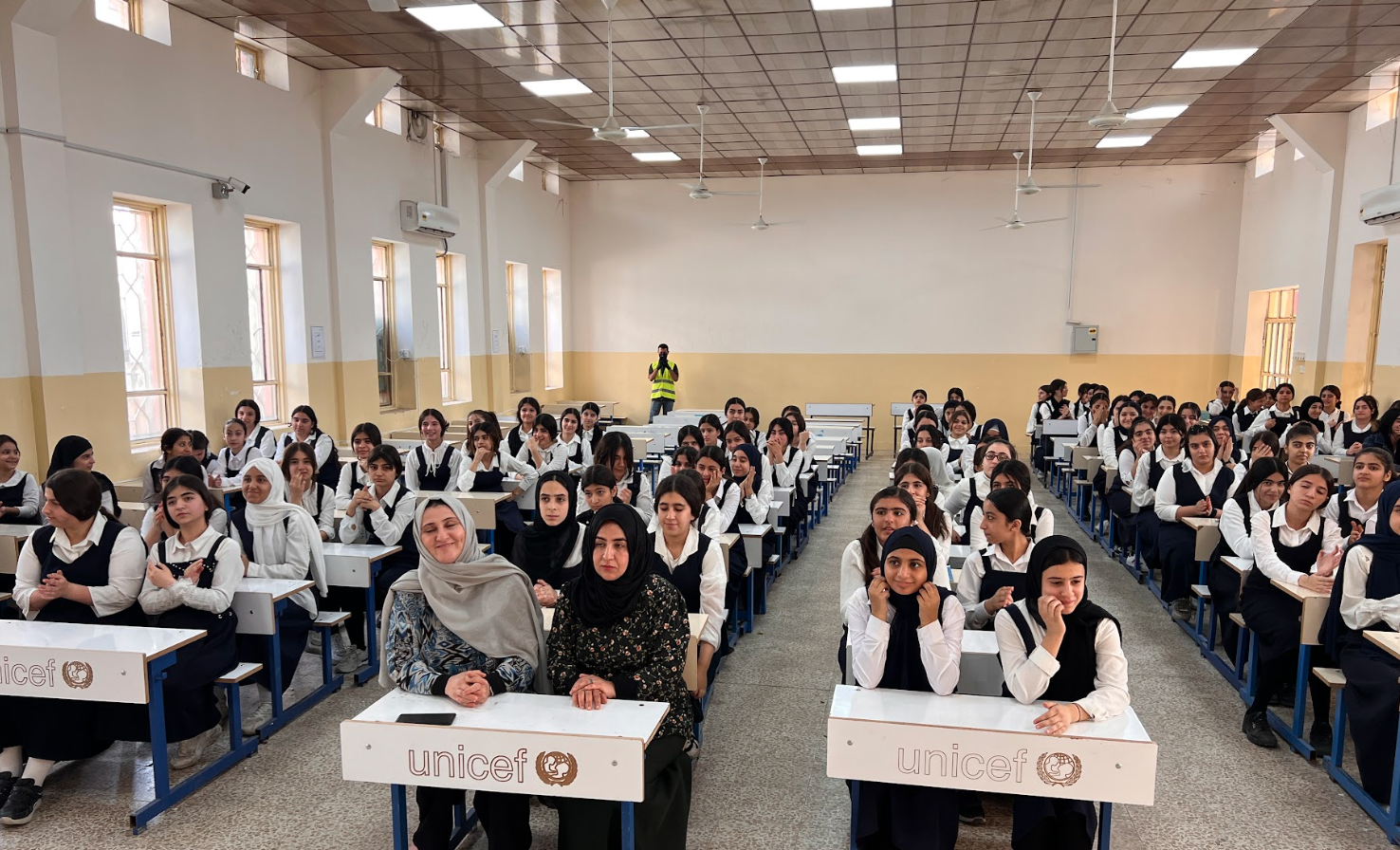
· New Life Green Generation: The Earth Sisters are distributing different types of trees to the mothers of newborn babies, so they can plant them in their gardens to encourage new growth and improve air quality. The initiative will also help educate the community on the importance of tree-planting to increase peace, cohesion and prosperity as well as adding beauty to the city.
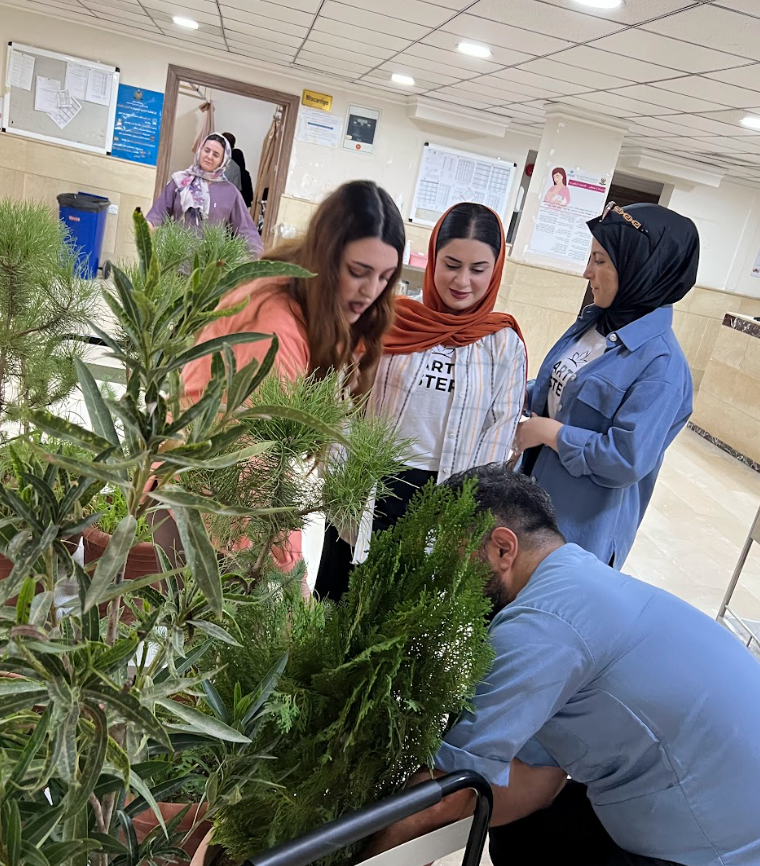
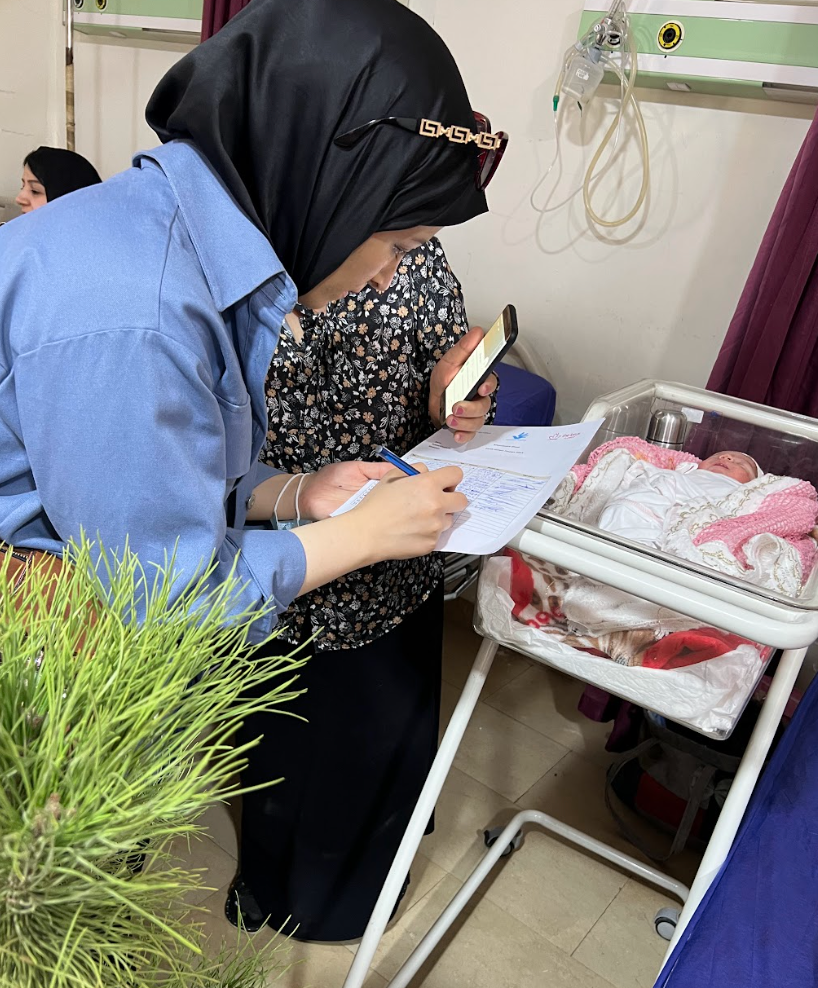
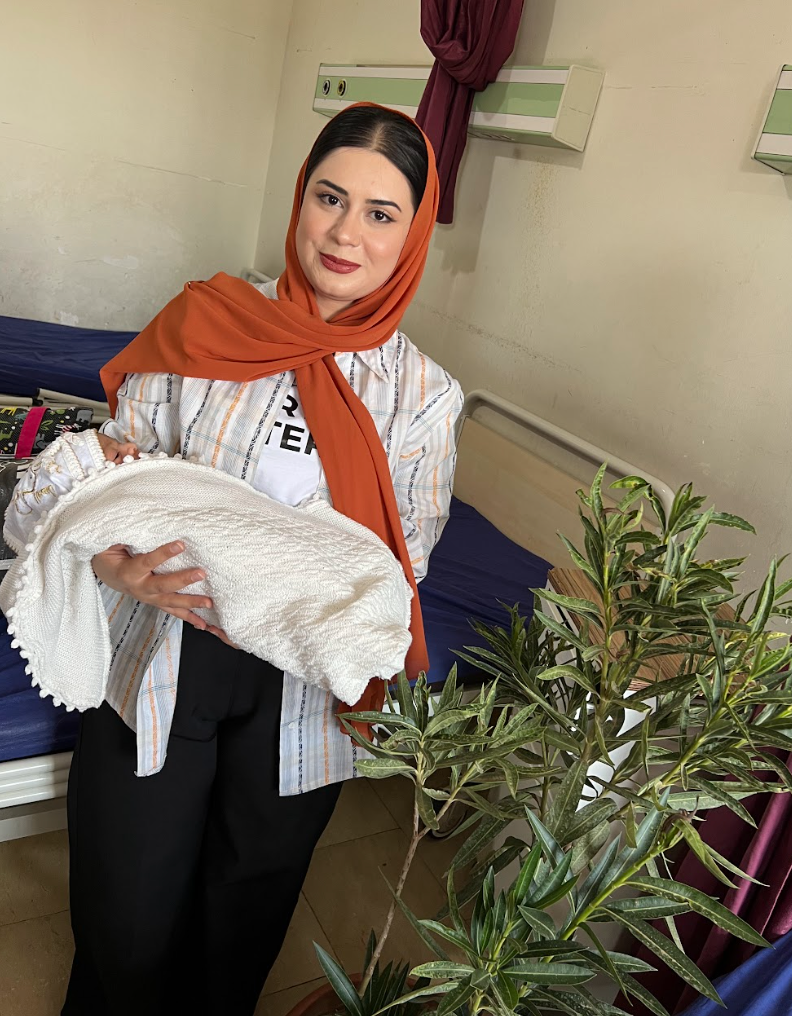
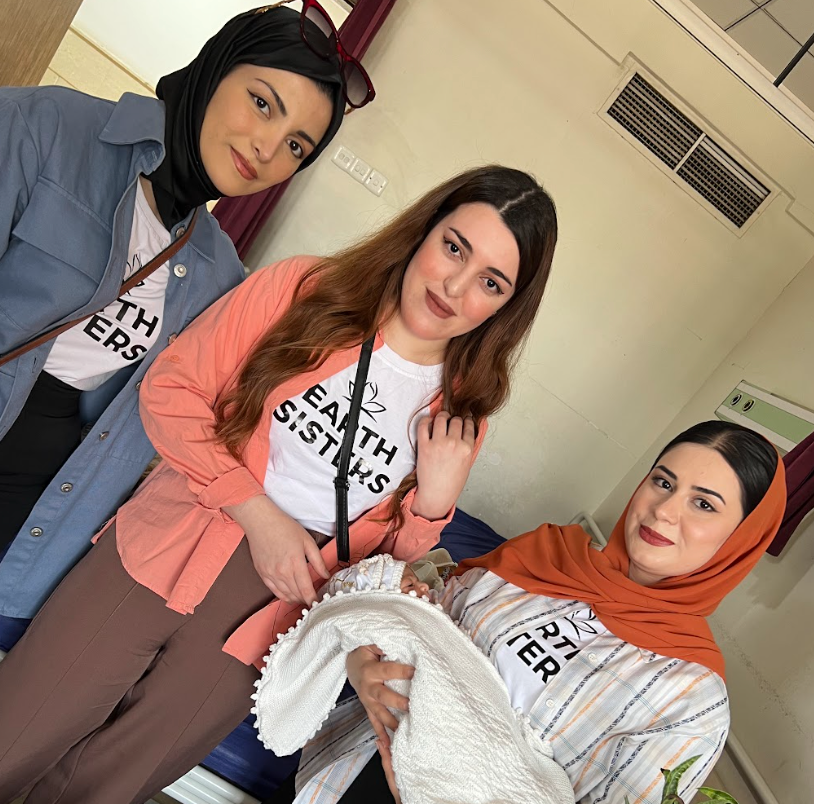
· International Environment Day: In coordination with the environmental department in Duhok, this initiative will consist of installing an irrigation system at Duhok University for watering newly-planted trees, which will help keep the air fresh and clean, while also encouraging university students to protect their own environment to reduce climate change effects.
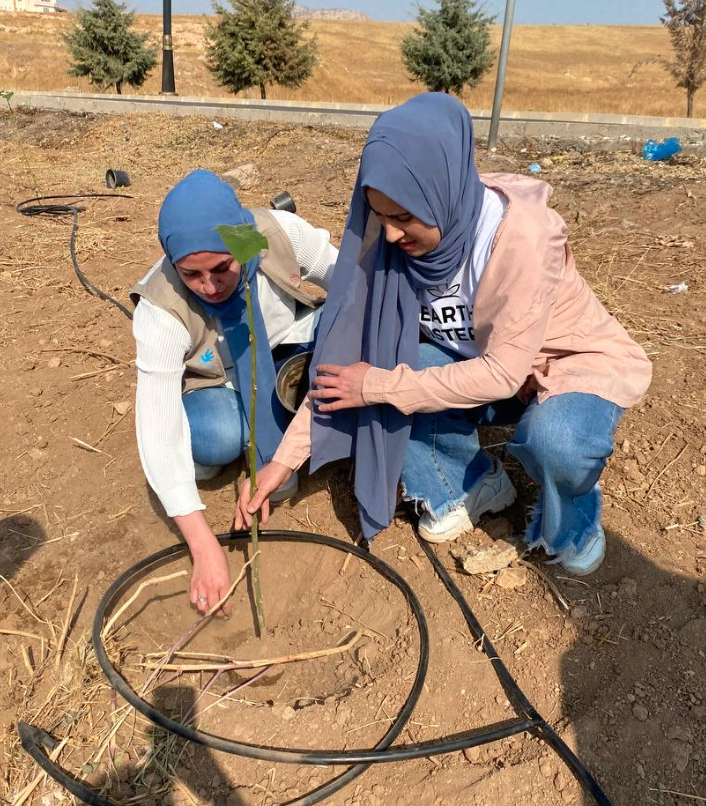
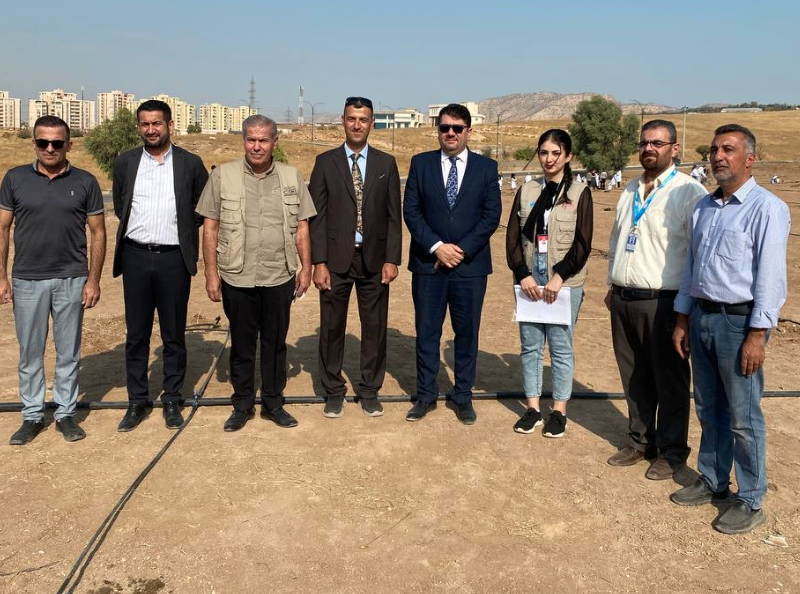
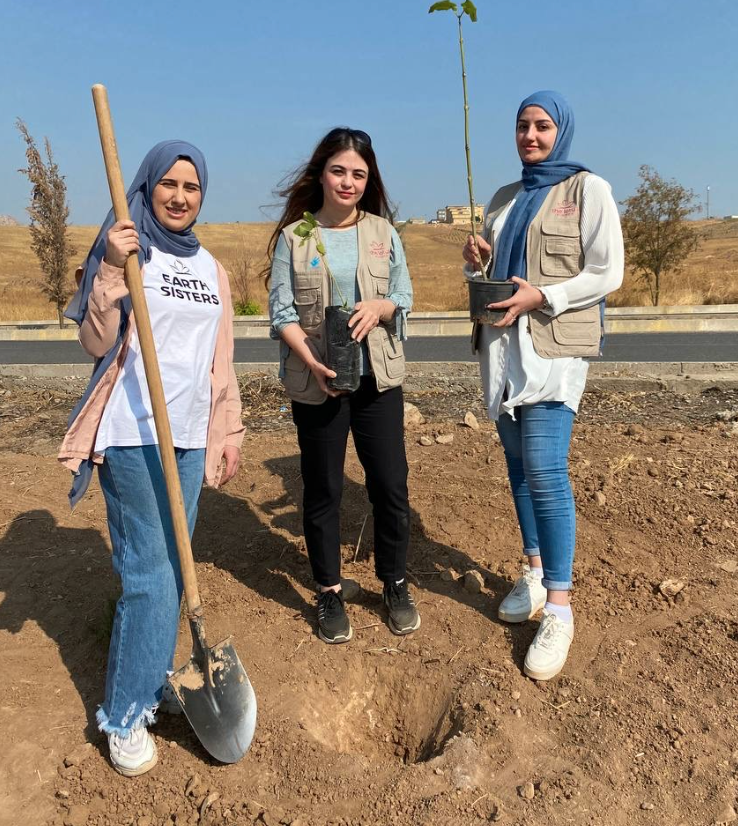
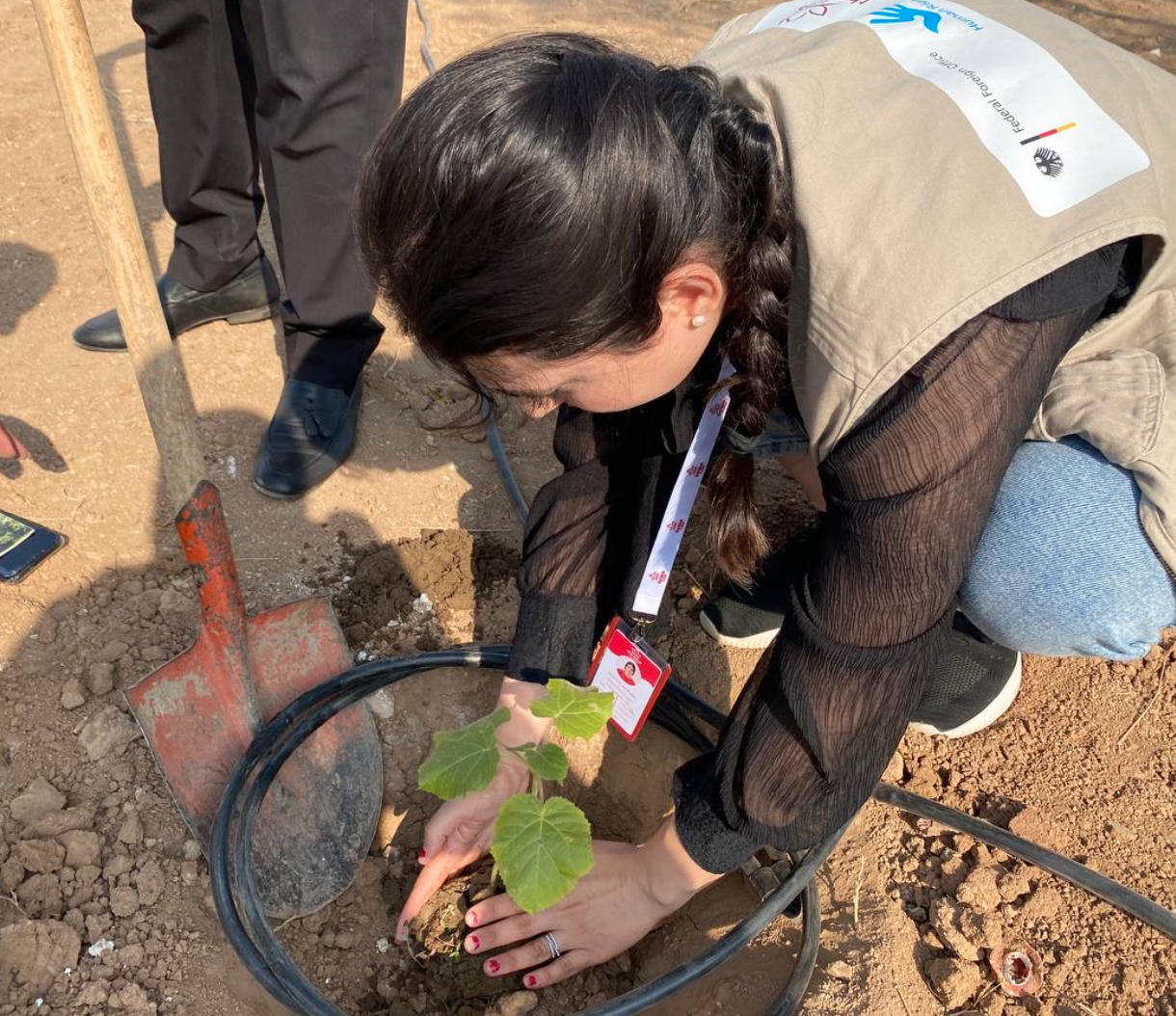
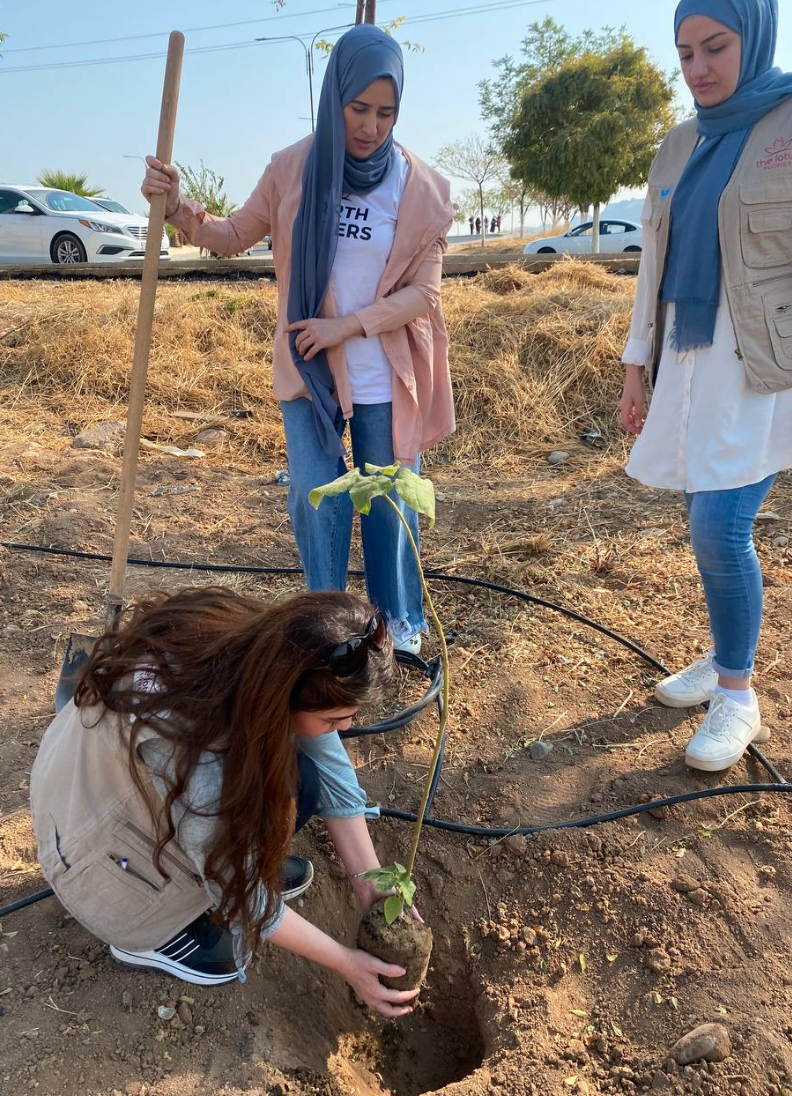
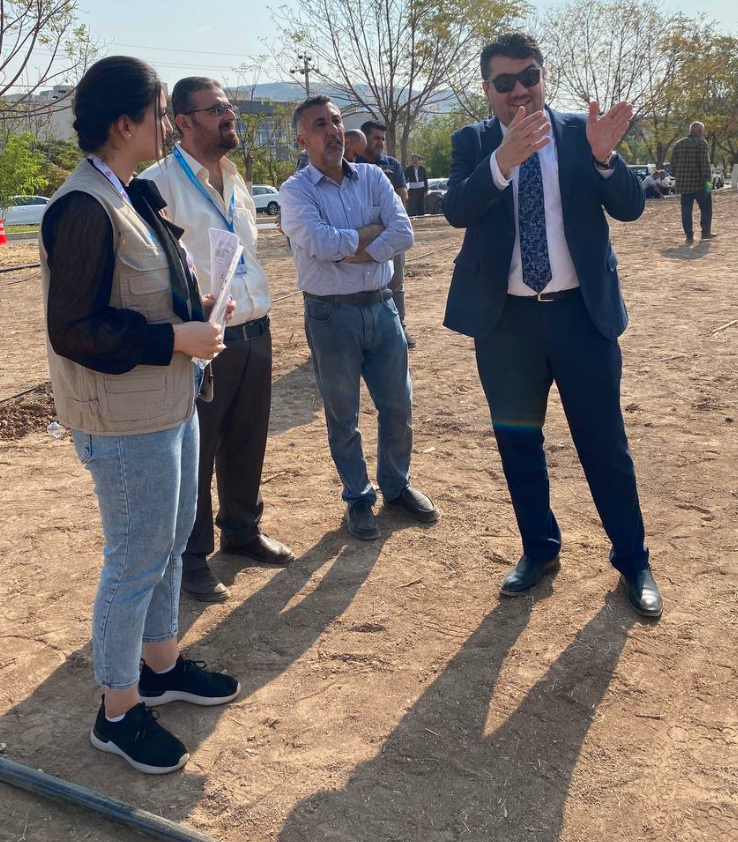
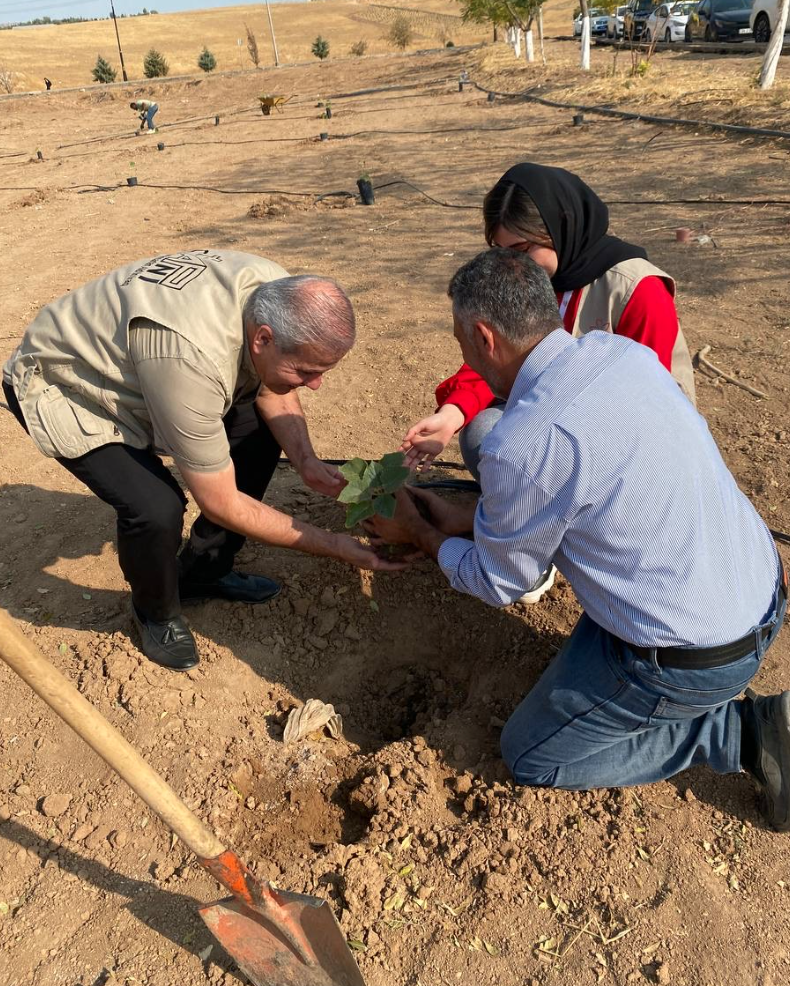
· Safe Water: This initiative sees the Earth Sisters providing environmentally-friendly reusable water bottles to school students in order to decrease reliance on disposable plastic water bottles. It also aims to reduce health issues including dehydration and fainting, while improving other essential bodily functions and preventing illnesses associated with water toxicity.
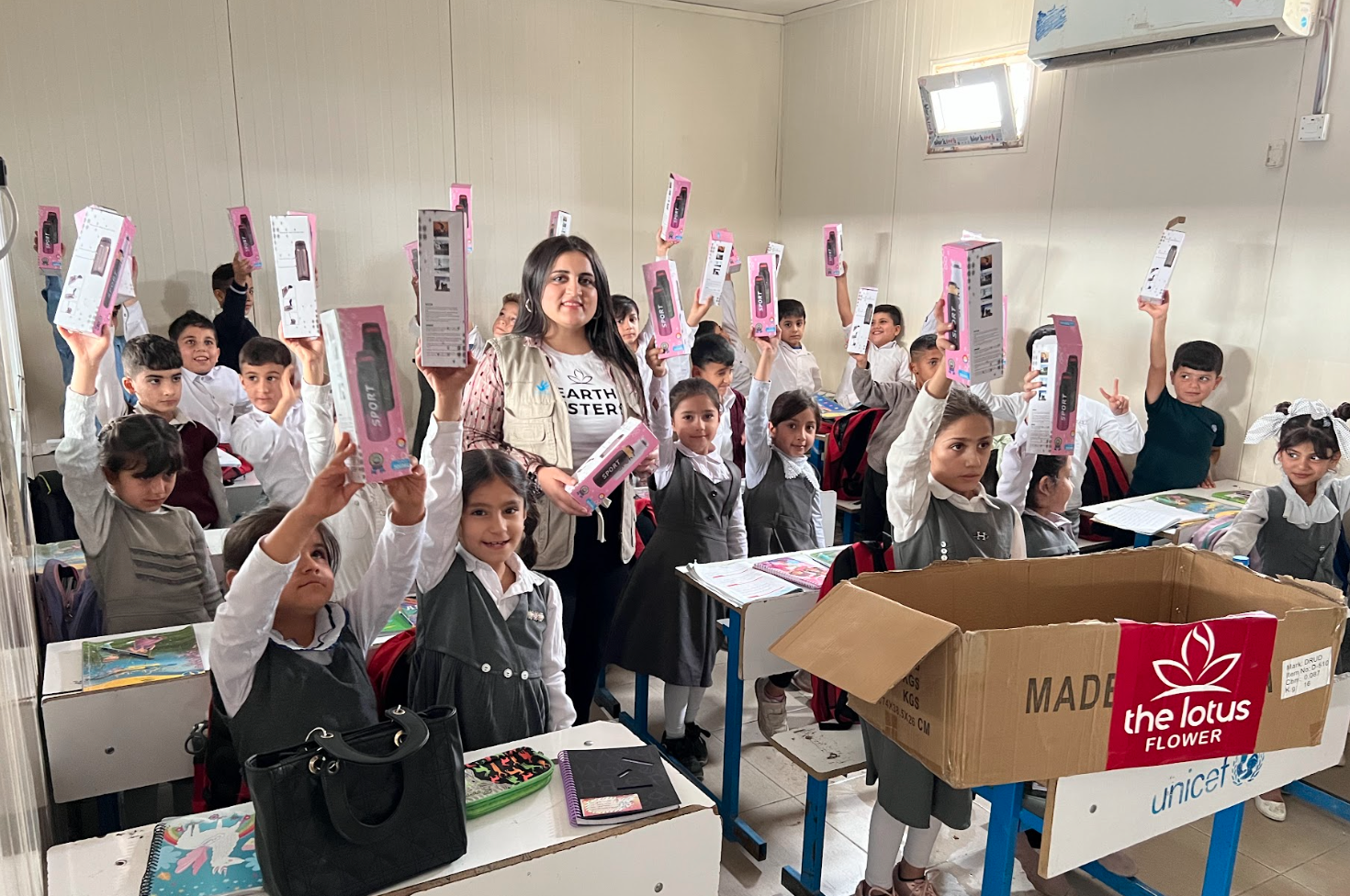
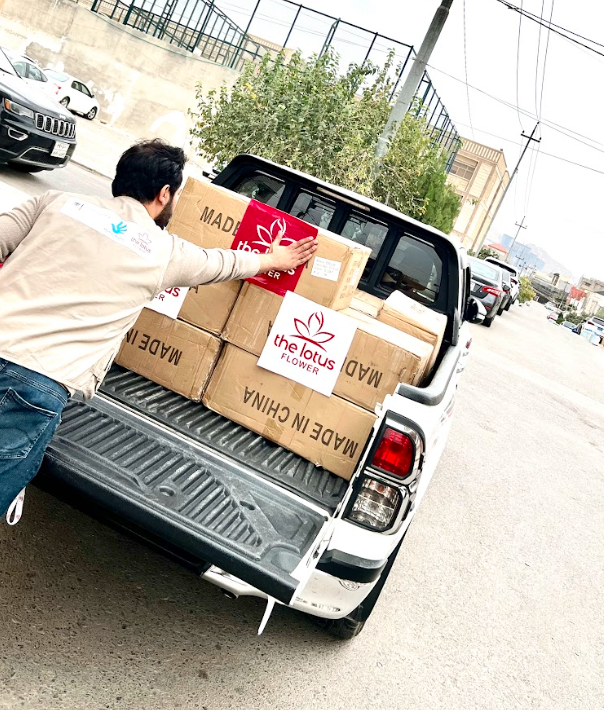
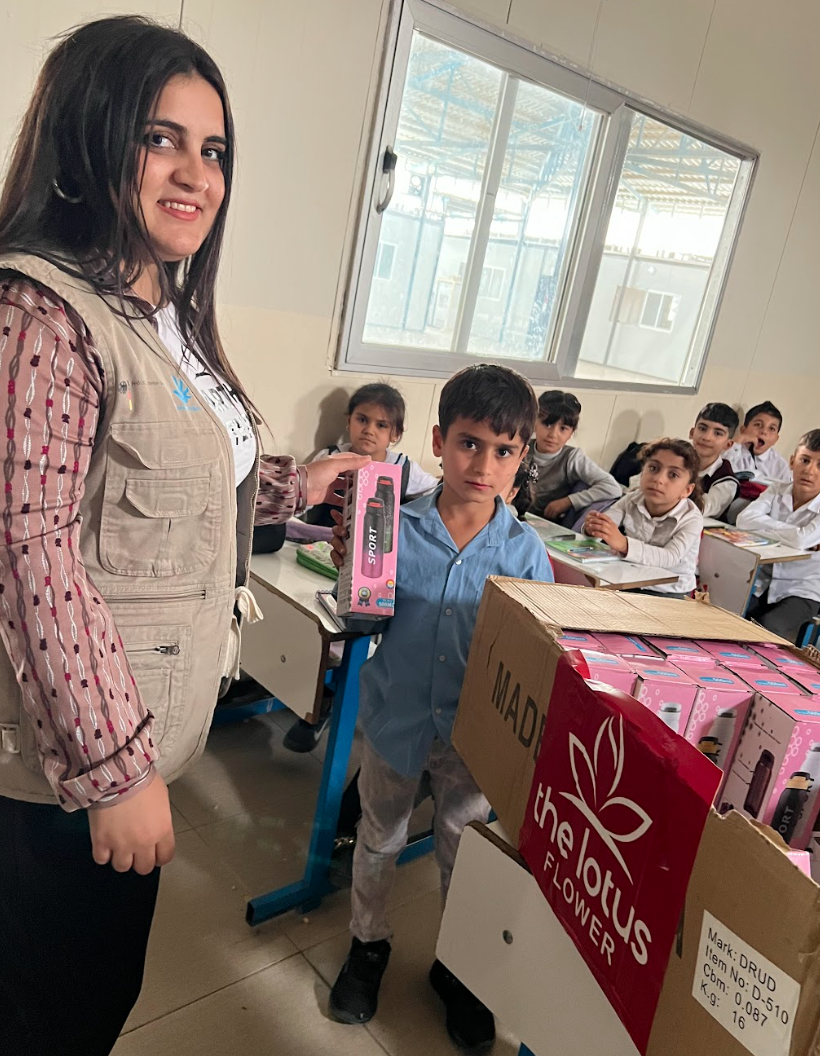
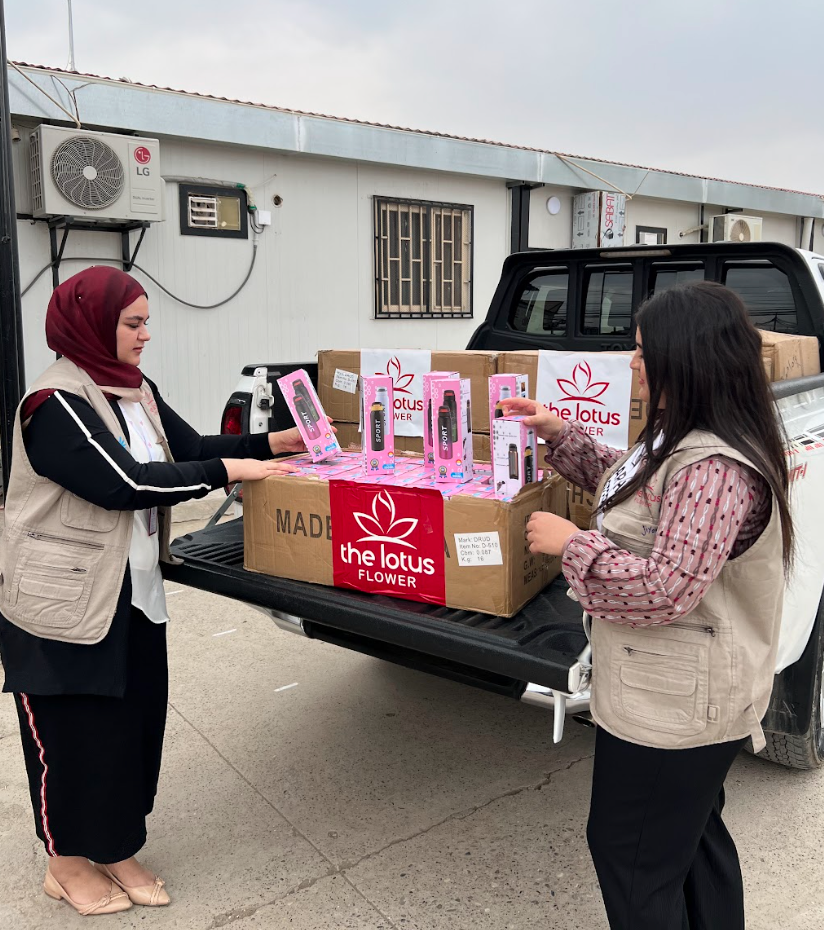
· Art can Change: This initiative at Duhok University and Daliva school showed how climate change can be tackled through art - encouraging young people to take better care of the planet through their actions.
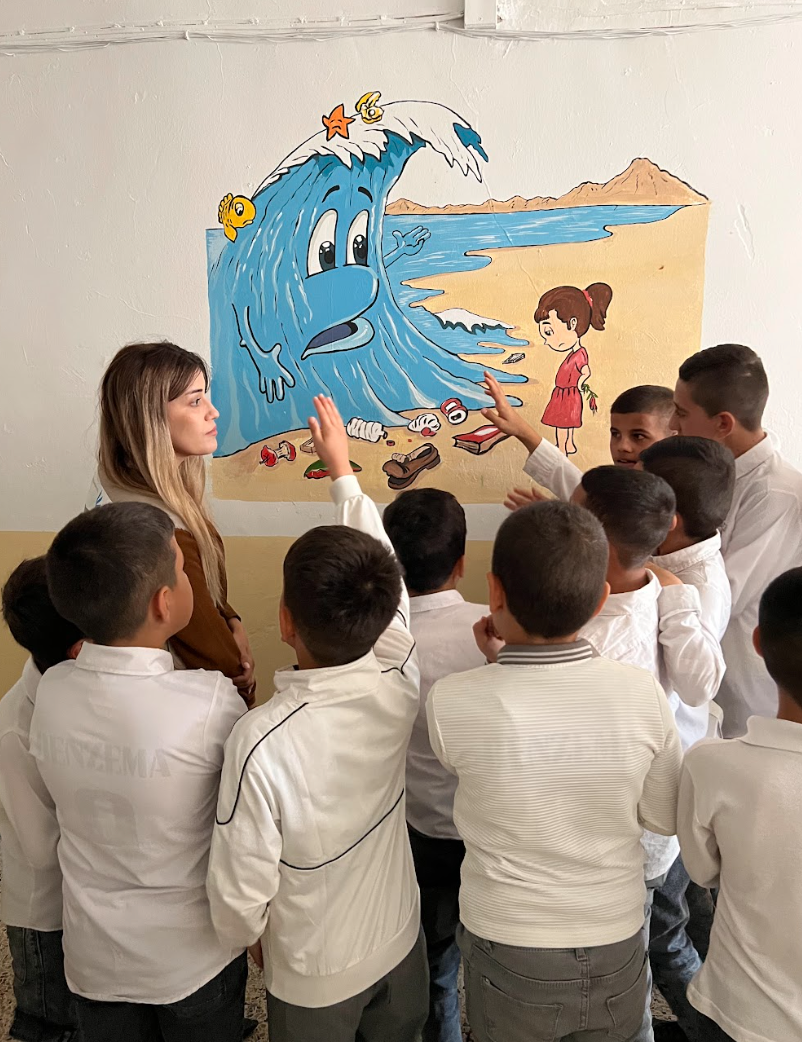
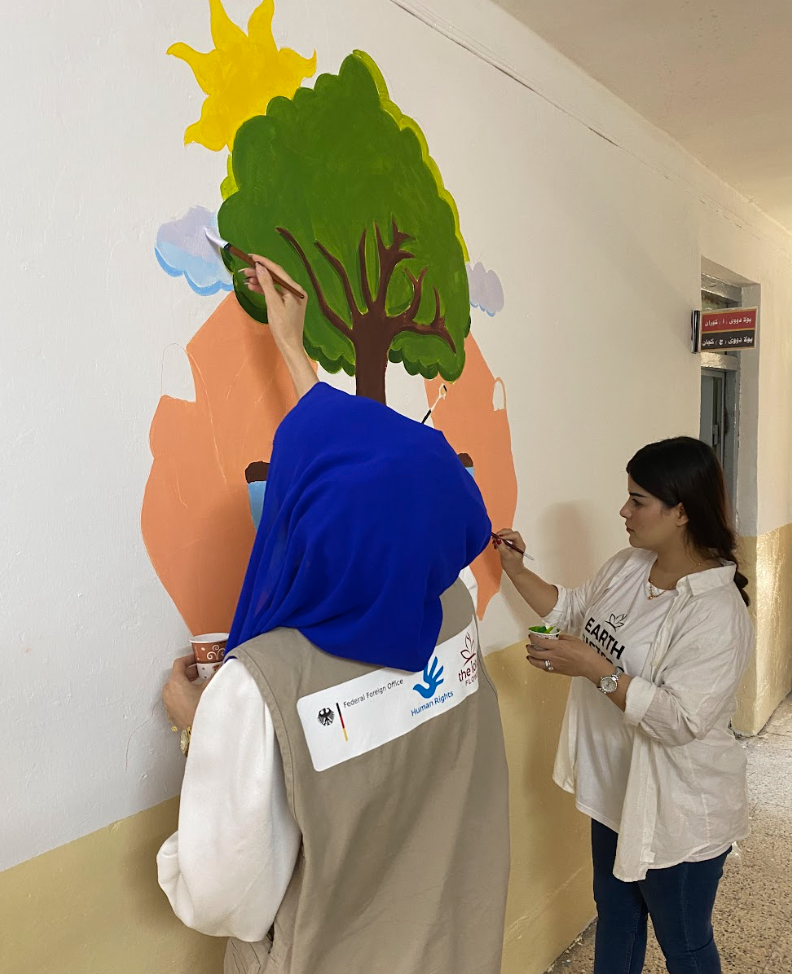
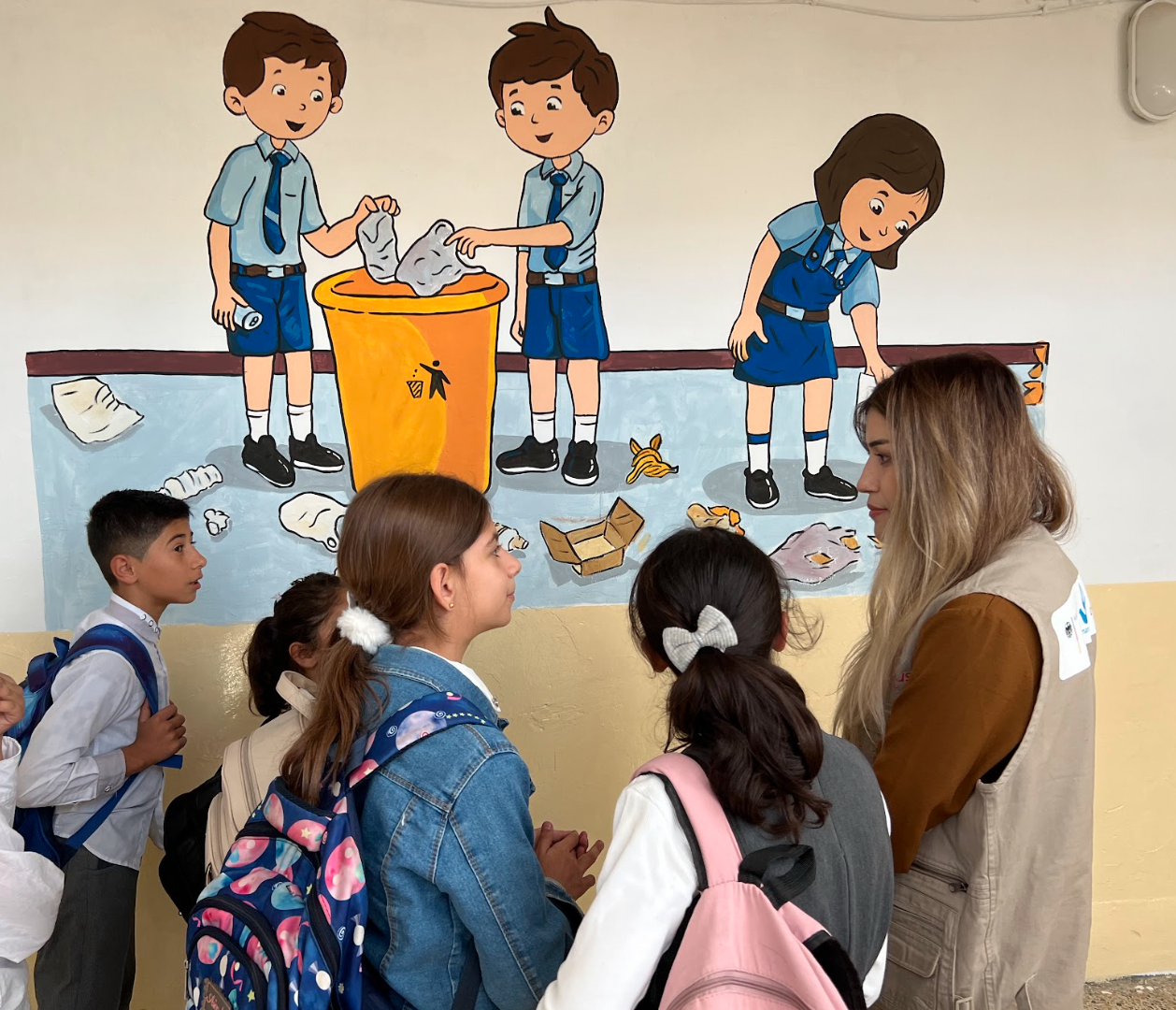
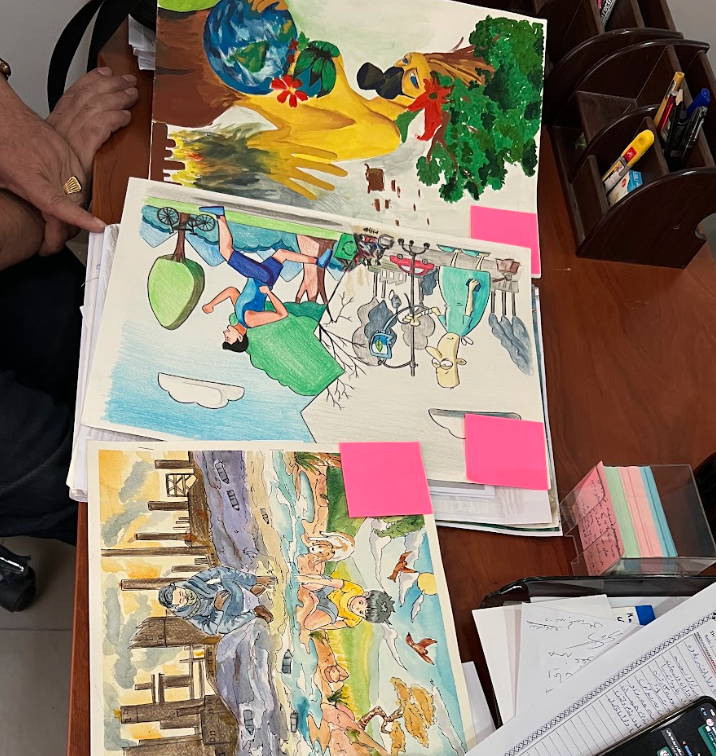
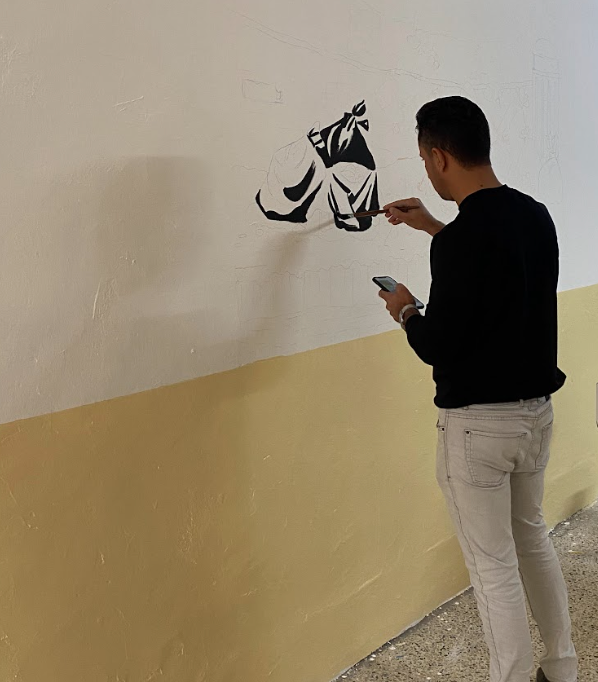
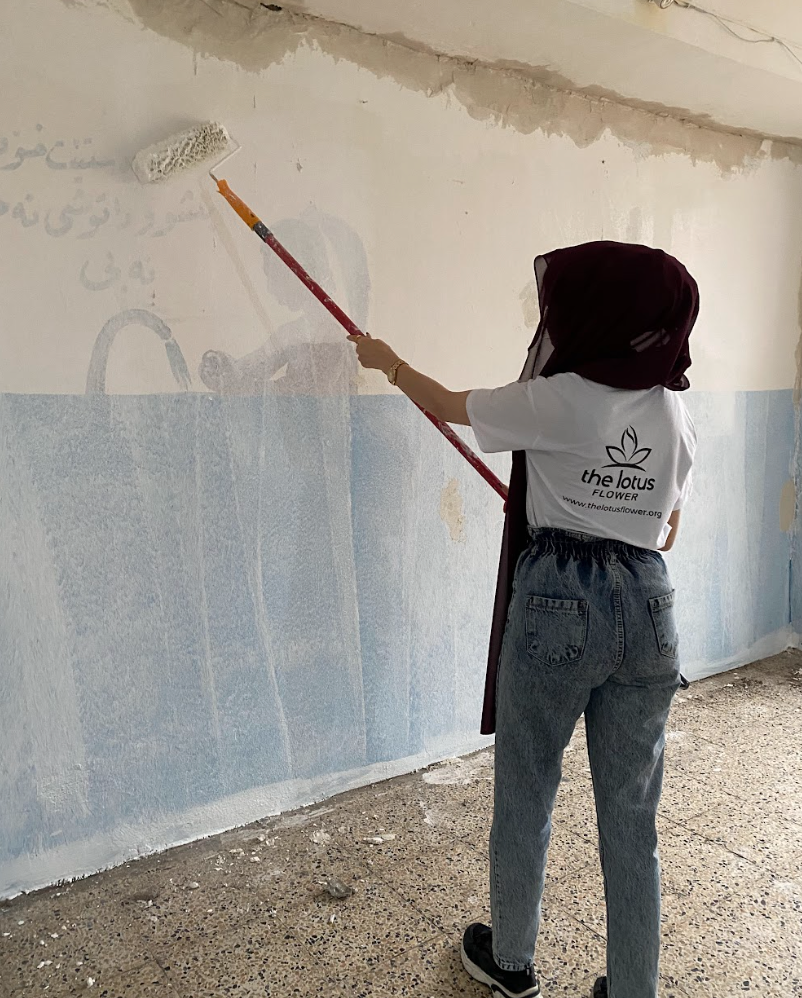
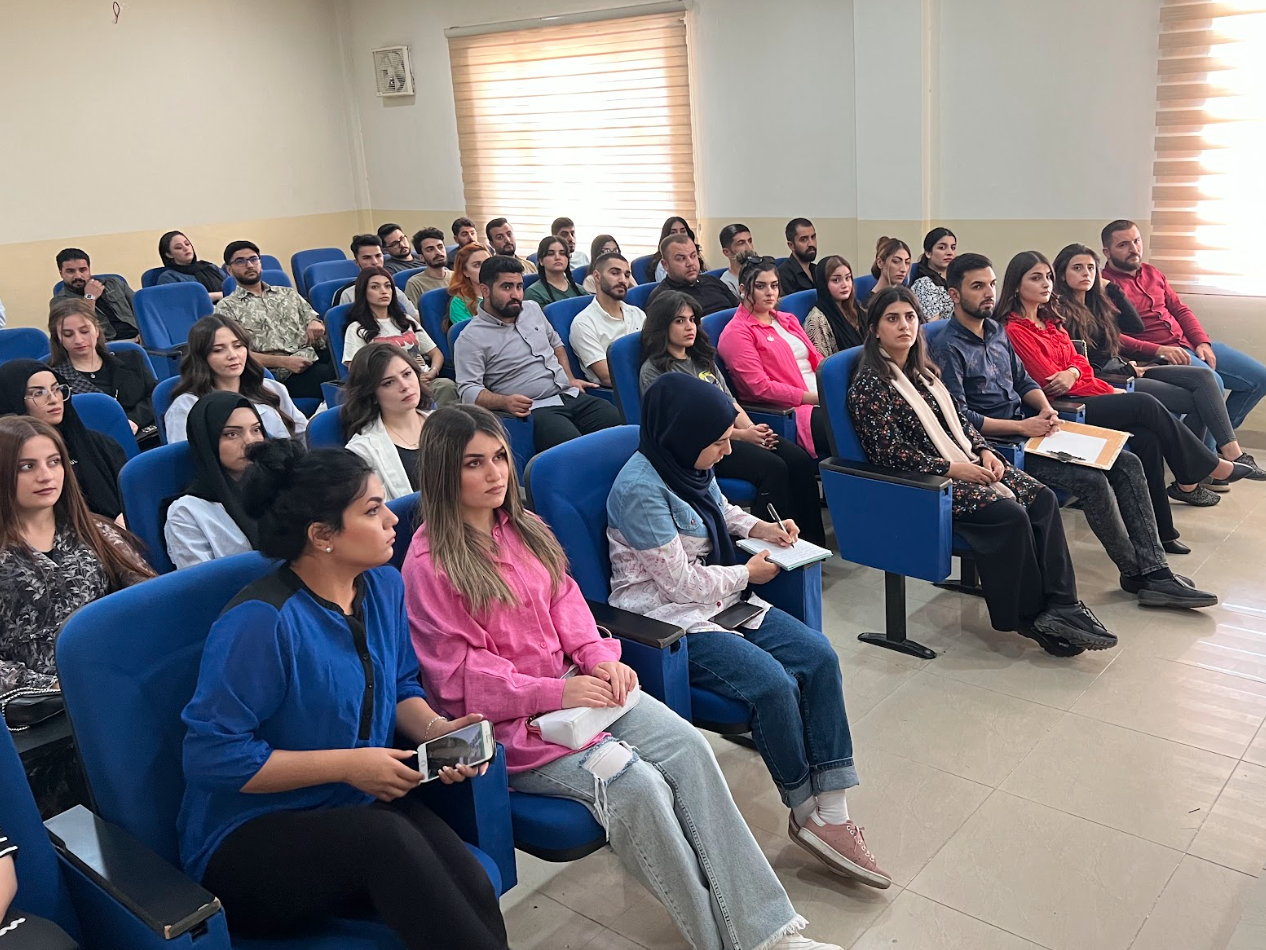
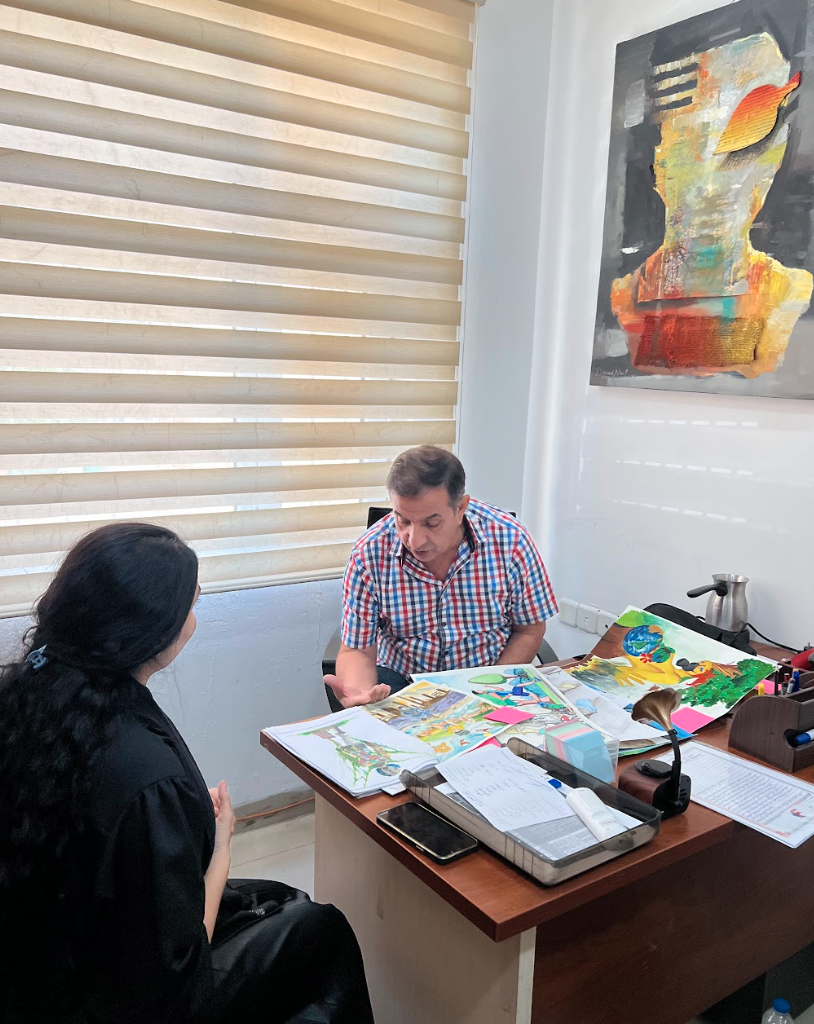
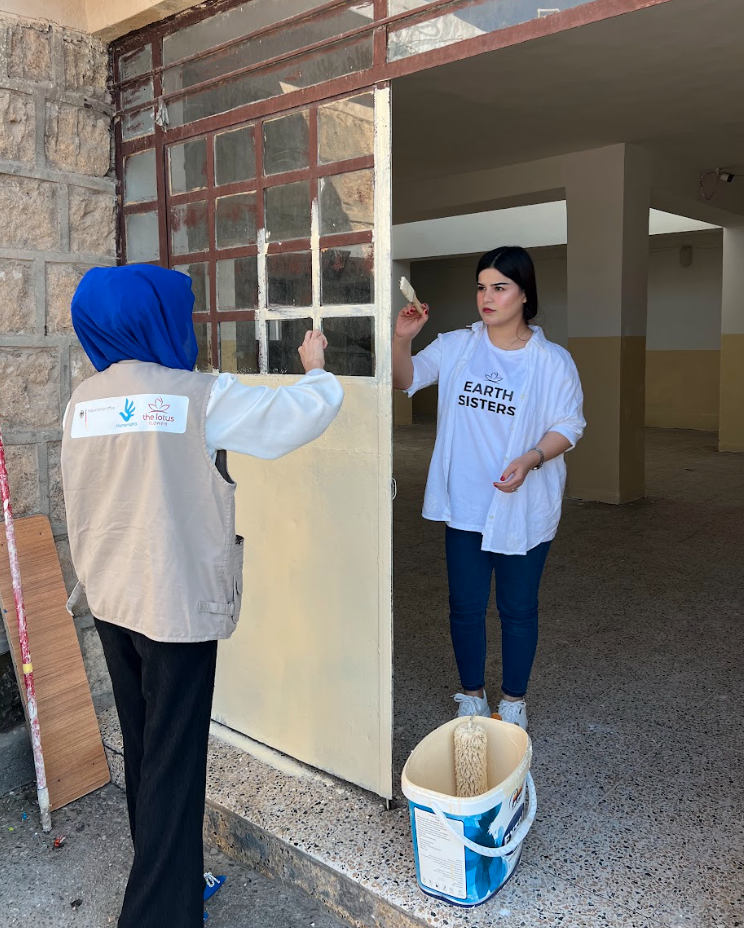
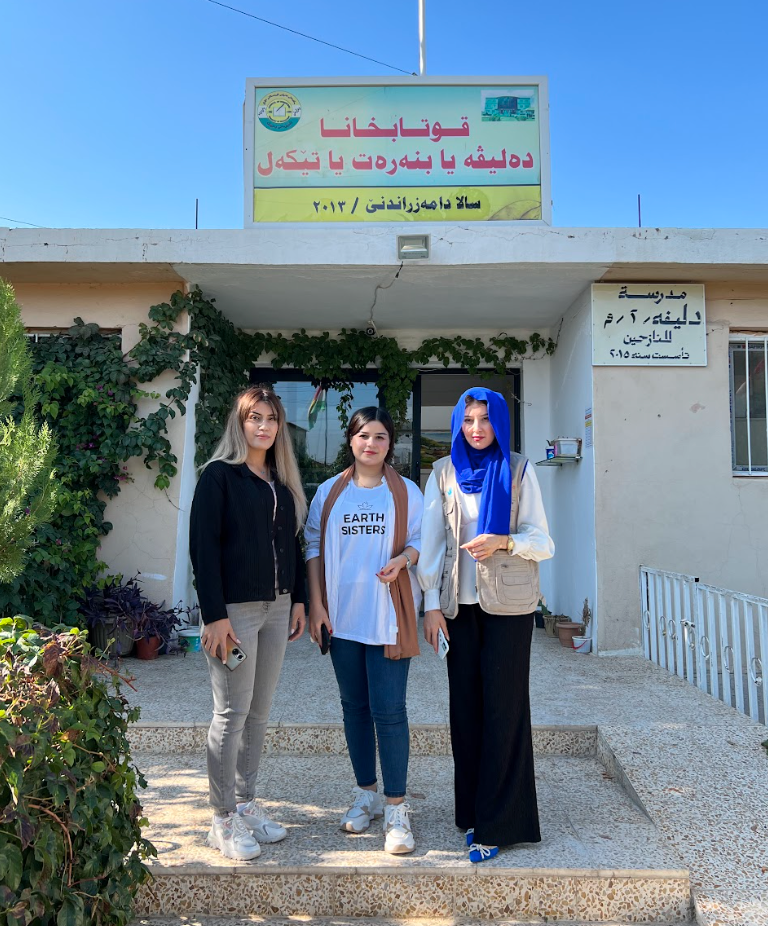
Earth Sisters is our pioneering project supported by the Consulate General of Germany in Erbil, and also saw participants trained in communications, critical thinking and leadership skills.
We’re so proud of everything they have achieved on this project.
Sisters’ Stories: “It’s hard to express the happiness and hope this project gave me”
Ghayda is a 22-year-old Yazidi girl from Bashiqa, whose father was a successful beekeeper before he lost everything in the ISIS attacks.
In the aftermath of the conflict, Ghayda found herself stuck at home and suffering from feelings of depression and despair. However, when she decided to participate in beekeeping training conducted by a local organisation, things began to turn around for her. In addition to what she had learned from her father over the years, the training gave her a good theoretical background on caring for bees and making honey.
Having always clung to the hope that she would be able to start her own beekeeping business and engage her father in the practice again, Ghayda recently had the opportunity to take part in our business management and training project, which is kindly supported by Stiftung Entwicklungs-Zusammenarbeit Baden-Württemberg (SEZ).
The training and business grant Ghayda received meant she was able to kickstart her dream, and thanks to support from our psychosocial facilitator, she refused to let any negative feedback stop her. Rather than accepting gender stereotypes which imply that females are not acceptable or qualified to run such a business, she insisted on being part of the change. “I became completely convinced that females can run businesses just as well as males, and that they can even do it better,” she says.
As well as keeping bees, Ghayda now has ambitious plans to establish a sweet-making business which can operate during their hibernation period. She has also found herself sharing mental health advice and life skills with other women she knows.
Overall she has found the experience has really changed her life for the better, and says: “The Lotus Flower provided me with an opportunity to work in the beekeeping field and it’s hard to express the happiness and hope this project gave me.
“I also got rid of my depression and I now have strong self-confidence and am more aware of everything.”
Through this project, we have been able to provide financial grants to 50 women like Ghayda, as well as psychosocial support and awareness of critical topics such as gender-based violence. As a result, the women have not only elevated their income but also become better able to care for their families, without relying on external assistance. It has also sparked wider engagement, inspiring more women to step forward and contribute to the collective growth of their communities.
We’re so pleased with how this programme has turned out and will share more stories from it soon…
Sisters' Stories: “Drawing allows me to channel negative energy within me”
Nadima is an 18-year-old who was displaced from Sinjar during the ISIS conflict, when she was just a young child. “My life before displacement was beautiful,” she recalls. “I used to go to school, play with my friends and classmates, and I was very happy. However, everything changed on that dark day in 2014.”
Like so many others in the region, Nadima was fast asleep at home when the attacks first turned her family’s life upside down. “I heard the sound of gunfire, and when my family and relatives gathered, we decided to try and escape because if we stayed, we knew they would kill the men and take the women. We fled to the mountains and stayed there for seven days. We had very little food and only a small amount of water for more than 60 people.”
The family then walked to the Syrian border and eventually reached Kurdistan and the relative safety of Essyan camp. Nadima began attending school there, but now has to study and maintain a job at the same time because her father is ill and unable to work to support them.
“Life in the camp is tough,” she says. “Some nights, we can't sleep because we fear our tents might catch fire, and we might burn with them. The tent is not really a shelter from the harsh conditions and weather either.”
She first heard of the Lotus Flower through a Facebook post about our art therapy classes, and adds: “I attended the course and discovered my love for art. Drawing allows me to channel negative energy within me and transform it into beautiful artwork. I have benefitted greatly from the course, and it has allowed me to leave my tent and make new friends.”
Our art therapy classes have extremely positive effects on many of those who survived the conflict, and self-expression through creative practice is known to alleviate trauma, as well as improving mental health.
We’re so glad Nadima has found an outlet for what she suffered as such a young girl, and what she continues to endure while living in displacement…
Guest blog: My experience coaching the Boxing Sisters
Journalist and female fighter Beth McLoughlin recently visited us in Kurdistan to run some coaching sessions for our Boxing Sisters. Here, she writes a guest blog on her experience…
When I won my first boxing fight, I climbed the ropes with happiness. It wasn’t just a sporting victory for me, but the culmination of a journey that helped me get over an abusive relationship. I started to wonder if boxing held some magic ingredient that could help people deal with traumatic events, in a way that talking about them sometimes cannot. The idea for a book was born.
I was desperate to see The Lotus Flower’s Boxing Sisters project in the Rwanga Camp when I found out about it. Like many of us, I grew up hearing that men and boys could benefit from boxing and other combat sports, because it channelled their anger and could help them with their confidence. But what about women and girls like the Yazidis who had been displaced by ISIS? What happened to their rage, the thoughts and memories they couldn’t talk about, their sense of confidence and identity? I felt sure that boxing could play a role in their recovery, but I wanted to see it for myself. I went to run some skills classes and interview the women and girls to find out more.
The Boxing Sisters project proved to me more than I could ever have imagined just how powerful this sport can be. Nathifa, their trainer – who was originally trained by British boxer Cathy Brown – told me that some of the women could barely hold a bottle of water without their hands shaking at first. Now, they approached the heavy bag like prize fighters, calculating each punch with precision and letting their hands, feet – and feelings – fly freely and flow openly. It was a joy to watch.
Beth with Nathifa
I asked one of them what she thought about ISIS. “There are no words for what they did,” she said. It struck me that boxing is also a thing that happens beyond words, in the heat of the moment, when you are not consciously thinking about anything. Trauma can be isolating. Sometimes people are too ashamed to share with others what happened or how they feel. But here in this small cabin, some of that was released, emotions were shared, and connections were once again formed. It seemed to happen effortlessly.
When the women feel physically strong through boxing, this spills over into other areas of their lives, the group’s psychotherapist explained to me. They no longer feel hopeless and defenceless. The past can start to become the past, instead of perpetually present.
Boxing can be a tough sport and I saw great strength among the Boxing Sisters, awe-inspiringly so. It was also one of the most nurturing environments I have ever been in. Behind the gym, a small garden flourished, and I ate delicious green beans that had been plucked that morning.
I was profoundly affected by what I experienced, in what I know is only a tiny part of what the Lotus Flower does. So much so that I broke my vow of journalistic detachment and objectivity quite soundly, and shed a tear as I said goodbye (though hopefully not for the last time). Boxing Sisters should be an international movement.
Follow Beth on Instagram @beth.a.mcloughlin
Our donor shares post-visit feedback on our “remarkable impact”
We were thrilled to host one of our donor organisations, The Give It Forward Trust (GIFT), in Kurdistan recently – and equally delighted to hear what they had to say about our work afterwards.
Following the trip, Sophie Pelka from GIFT said of the Lotus Flower: “Your dedication is palpable; changing lives day after day.”
She also drew attention to our “remarkable impact,” and called our range of activities “vast and inspiring.”
Leysa and Sophie, second and third from the left, with our CEO Taban in the centre
During the visit, Sophie, who was joined by Leysa Noble, was able to check out a range of projects, including Boxing Sisters, our literacy classes and new Power Girls Gym.
They also saw first-hand the greenhouses we’ve recently renovated so that women can grow their own vegetables and feed their families, while earning an income for themselves. And they also visited some of the women’s thriving in-camp businesses which have been established through our small business training and financial grants.
Receiving feedback from our donors is vital to us an organisation, as the thing we value above all else is ensuring we keep delivering life-changing impacts on women and girls’ lives. So to have our projects, our operations and our leadership all so strongly validated by a key donor means absolutely everything to us, and we’re feeling incredibly proud.
Sisters’ Stories: “It was my dream to have my own business”
Seve is a 29-year-old displaced woman who was forced to flee her home in 2015 during the ISIS conflict.
Devastatingly, she lost one of her eyes during the tumultuous period, but a critical lack of money prevented her from seeking proper medical treatment – especially as her husband also needed treatment for long-term illness.
But thankfully, things recently took a turn for the better, when Seve was selected to receive business training and a financial grant through our project with The Big Heart Foundation and NAMA Women. Using her new skills and the funding, she decided to open her own small supermarket in Essyan camp. In the shop she sells all kinds of foods, snacks and cosmetic products, and her new venture is thriving within the community she serves.
“It was my dream to have my own business and to support my family,” she says. “I am happy now.”
While providing a much-needed source of income, the business also serves as a fitting symbol of Seve’s strength and resilience. In her role, she is able to juggle her responsibilities as a businesswoman, caretaker and the breadwinner of her family, and it gives her a much needed focus when other aspects of life in displacement are so difficult.
Now saving up for the eye surgery she desperately needs, Seve is hopeful of a future where she can prioritise her own health – without compromising the wellbeing of her family. “I’m so grateful for the amazing support,” she says. “Hopefully the Lotus Flower will be the reason that I’ll be able to see from both of my eyes again in future.”
We very much hope so…
You can see Seve in this short video about this project below, too.
Watch our CEO Taban on the ‘How I Became’ podcast
Our Founder and CEO Taban has taken part in one of her most in-depth and moving interviews to date – which you can watch in full here.
The recent interview was for the How I Became podcast by Unify, and explores Taban’s traumatic past in Iraq, in which she survived genocide and was imprisoned with her family as a young child. It also sees her recount her later journey in setting up the Lotus Flower, and how she found her true purpose in life.
While you can listen to it on-the-go as an audio podcast on Spotify or Apple, you might prefer to see the full recording instead, as it’s certainly a deeply powerful and engaging watch.
As her story slowly unfolds, you’ll hear Taban recall the moment she was playing in the garden when Saddam Hussein’s police turned up and took her and her mother to prison, along with her grandparents. “All the adults were begging them not to take me because I was a four-year-old,” she remembers. “But they took us.”
She then looks back on their terrifying time in prison, as well as the realisation they were to be taken away in buses and buried alive in mass graves. “Part of that process is for you to see the diggers. You know you’re going to your death,” she tells podcast hosts Ashley Samuels-McKenzie and Charles Parkinson. “They’ll start shovelling sand over you, so it’s a very, very slow torturous death.”
Taban also covers the family’s remarkable escape and time spent in hiding in Iraq, as well as their eventual rescue by Amnesty International and move to the UK, where they arrived as refugees to start a new life.
The podcast then covers Taban’s return to her homeland during the ISIS conflict in 2014, and why she was unafraid to help with the aid effort – despite huge danger and risk in the region. “Things that are very extreme don’t scare me,” she says. “I think that’s because we were exposed to it at a very young age.”
Taban also opens up about surviving an abusive marriage, and turning her past pain into purpose to establish her life’s greatest passion – the Lotus Flower.
And finally, she reveals her hopes for the future, and what still lies ahead: “It’s been a very surreal journey and I feel like I’m only just beginning, because it’s the first time where I don’t feel like I’m in prison,” she says. “I actually feel like I can breathe now and get on with the work I need to do.”
Please do check out the whole interview below – we’re certain you won’t regret it!
Meet our team: Lotus Driver Pasha on why his job is so important to him
Pasha is one of our drivers, who has been working with us for more than a year now.
Originally from Sinjar he was displaced during the ISIS conflict along with his two brothers, two sisters and their mother. “We were asleep in our village, but when we found out everybody in the area had escaped we fled to the mountain. Me and one of my sisters were separated from the rest of the family for three days. Then we came to at Rwanga IDP camp.”
High school graduate Pasha had previously been a volunteer with both local and international NGOs, and used to have a bus which he used to transport students to different universities. “Then I would take Lotus Flower beneficiaries from Rwanga camp to Duhok, and I formally became a driver for the organisation in May 2022,” he says.
Since January he has been assigned to our Child Protection project with UNHCR, and his main role is to transport staff between various centres and camps. “I go nearly everywhere in Kurdistan – to all the places that the Lotus Flower has services.”
Speaking of what he most enjoys about his job, Pasha adds: “The best thing is when the staff are in the car with me and they’re happy with my service. We are all like friends here.”
Although his role keeps him very busy, he’s also working on his own personal development too, saying: “People may not know this, but I stay at the office after working hours to study English, as I want to improve my skills.”
Pasha believes if it were not for his job, things may be very different in his life. “If I was not working for the Lotus Flower now, I would have many problems – some of them financial.”
As father to a two-year-old daughter, his hopes for the future are simple: “Life in camp is very hard. I want to keep working for my family, and hope for a better future where I can return to Sinjar and buy us a house there.”
We’re very pleased to have Pasha and so many other hardworking drivers on our team…
Our new awareness video on drug addiction and GBV goes live
As part of our big project with the UN Trust Fund to End Violence against Women, we’ve created a new awareness-raising video to highlight the dangers of drug addiction for women and girls.
Rising dependence on drugs is known to be one of the key causes of increased cases of violence against women and girls in Iraq, and our video aims to show the dangers of trying drugs, which can quickly spiral into full-scale addiction.
As you can see in our campaign story, young women who become desperate for their next ‘fix’ often spend all their money or even steal from loved ones to pay for drugs. When they can no longer afford to pay, they are often coerced into sexual servitude, beaten or blackmailed by drug dealers. Feelings of shame and fear of the consequences then prevent women from seeking help from family and friends, causing the spiral to deepen further.
The UN’s National Strategy to Combat Violence against Women 2018- 2030 sets out to include newly emerged social issues such as drug addiction, organised crime, and suicide, all of which have become a major contributing factor accounting for different forms of violence against women and girls.
The anti-narcotics authority in Kurdistan recently announced that it had confiscated more than 50kg of methamphetamines – known commonly as crystal meth – which has become one of the widely trafficked illicit drugs across the country. Other drugs rising in prevalence include Methadone and Captagon pills, a methamphetamine-like stimulant which can cause high blood pressure, hallucinations and blurred vision.
Kurdistan 24 previously reported that 80% of drug users in the Kurdistan Region are between 18 and 35 years old, while 10% of drug users are women and 4% are under 18. In April 2023, the KRG's Ministry of Finance and Economy founded a Drug and Psychotropic Substances Fund, which aims to provide treatments for substance abusers as well as financial rewards to those who hand over illegal drugs to local authorities.
For those caught up in the web of drug addiction, women’s organisations like the Lotus Flower, health authorities and the police can also provide support, which is the message we are trying to get to as many people as possible with this video.
As well as raising awareness of gender-based violence and its many causes, our partnership with UNTF has also been supporting victims with mental health and case management services, as well as providing small business support.
Can you Support our work?
Our CEO Taban attends the Action Network on Forced Displacement in Berlin
Our Founder Taban was delighted to attend the 2023 meeting of the Action Network on Forced Displacement in Berlin this week.
The annual event focuses on ways of increasing the visibility of displaced women, and brings together key voices and minds to discuss sustainable solutions. Taban was also really pleased to be voted one of three spokespeople for the group, meaning she will play a more active role going forward.
The global network was first launched by Germany’s Federal Ministry for Economic Cooperation and Development (BMZ) in October 2020, and facilitates the exchange of ideas on women in displacement, while exploring ways of advising policymakers, the private sector and civil society.
Speakers included Svenja Schulze, the Federal Minister for Economic Cooperation, while German MP Derya Türk-Nachbaur, who has previously visited the Lotus Flower’s projects, was also a contributor. Debates and talks included topics such as the vision and mission of the network, feminist leadership approaches, different ways of working, partnerships and the role of displaced women in shaping the UNHCR’s Global Refugee Forum.
As Taban says: “It’s always great to meet inspiring women from around the world who are equally committed to prioritising the needs of displaced women.”
We’re so glad to be part of these important events through Taban, as it brings so much to the Lotus Flower in terms of knowledge-sharing, support systems and connections…
Sisters' Stories: 'I want to play a part in changing the climate for the better'
Mahabad is a 24-year-old originally from Sinjar who now lives in Shariya.
When ISIS attacked her family’s village in 2014, they had to leave their home and all they had known, seeking refuge on Sinjar mountain. “I witnessed the death of many women and children there, due to thirst and hunger,” says Mahabad.
After fleeing, they eventually settled in Shariya, but life was still very difficult. “I suffered psychologically, but we are coping with the situation and it is slowly getting better.”
Thankfully Mahabad was able to resume her studies, eventually graduating from the University of Duhok’s Department of Nursing in 2021. During the pandemic, she worked as a home visitor, and also in a pharmacy for four months.
Earlier this year, she applied to take part in our Earth Sisters project, supported by the Consulate General of Germany in Erbil. The project is raising awareness of the climate crisis in Iraq, and the ways it exacerbates gender-based violence, while also identifying ways of reducing risks. Participants have also been trained in communications, critical thinking and leadership skills.
“I wanted to take part in Earth Sisters because I wanted to learn about the connection between GBV and climate change, which was new and different for me. Being chosen as one of the 50 Earth Sisters made me happy, and I was very excited to participate in the training sessions – to gain knowledge, meet new friends and stop the process of overthinking which I had been suffering from.”
Mahabad is pleased to be helping raise awareness of the environmental crisis which is affecting Iraq, and says: “I want to play a part in changing the climate for the better, and to share these messages as much as possible.”
Over the coming weeks, she and her fellow Earth Sisters will put their training to good use by leading their own community initiatives on climate change and the ways in which people can reduce the risks. These will take place in and around Duhok, and will raise awareness of gender injustices, women’s rights, and crucially, the critical role women and girls can play in the global climate change response.
We’ll keep you posted on their progress…
Support our climate work
Sisters' Stories: 'I learned how to start and grow a business'
Amal is a 33-year-old displaced woman and mother of four, originally from Sinjar.
“My life before displacement was very difficult because my financial situation was so poor,” she says. “When I was younger, I was skilled at tailoring, but after getting married in 2014, ISIS entered Sinjar and destroyed and looted everything. They also took women and girls away and killed so many men.”
Amal and her children escaped to the mountains, which she calls “the only place that could protect us.” They stayed out in the open for 12 days without food and water, which was a plight suffered by thousands of other Yazidis too.
When Amal arrived at Essyan camp, she found life hard, but the only other choice was homelessness. A lack of money meant she couldn’t continue with her tailoring work, but she managed to save up with a friend to buy a shared sewing machine.
Eventually, she learned about the Lotus Flower through an advertisement in a women’s shop, and earlier this year saw that we were running a livelihoods initiative called She Leads in Food Security. “I participated in a course on nutrition, which benefitted me a lot because it taught us how to maintain our health,” she says.
“After that, I took a five-day business management course, which was very beneficial. I learned how to start and grow a business and how to manage it better. I was then selected to open a tailoring shop with the organisation’s support. I’m so grateful for the Lotus Flower’s assistance.”
Having recently ended, our She Leads in Food Security programme was delivered in partnership with CARE Iraq through Deutsche Gesellschaft für Internationale Zusammenarbeit (GIZ) GmbH. The initiative focused on providing income-generating and agricultural initiatives, as well as awareness-raising around the climate crisis in Iraq, and the escalating need for sustainable solutions.
Although the project has finished for now, its long-term impact is set to continue – with Amal and other women like her now able to earn incomes for themselves and support their families.
We’re so glad to see Amal making a success of her new business, strictly on her own terms…
We expand our services to three new women's centres
We’re so pleased to have started working in three new centres for women and girls – each of them in non-camp locations.
The centres are in Seje, Sharya and Khanke, which are districts near Duhok city where many displaced people live alongside host communities.
Designed to serve as safe spaces for women and girls, the centres will see us provide a range of much-needed activities, with support from our partners CARE Iraq and European Civil Protection and Humanitarian Aid Operations.
These activities include mental health therapy in individual and group sessions, as well as case management to help beneficiaries reach the protection-related services they need.
We’ll also provide coordinated referrals so that beneficiaries can be connected with other service providers in different locations. The centres will host awareness-raising sessions too, including advocacy on protection subjects and women's rights.
While we will of course continue working in our camp-based centres, we believe it’s so important to expand our reach to out-of-camp locations. According to a needs overview by the United Nations Office for the Coordination of Humanitarian Affairs, it’s where some of the most vulnerable people live, and extremely limited services mean they are often ‘left behind.’ With very few protection services for women existing in these out-of-camp locations, transportation issues also limit their access to what may be available elsewhere. Added to that is an entrenched stigma around women seeking support for mental health issues and other protection needs.
According to UNHCR Iraq, about 39% of the 93,000 Syrian refugees and 68% of the 625,000 IDPs hosted in the Duhok Governorate are living out of camps, the majority in urban areas, mixing with host communities. Many of these families and individuals live in informal sites, which include unfinished buildings and rented houses.
The same protection project has seen us providing cash assistance to those with little or no income in order to access essential support services, as well as legal help. And we’ve also been providing resilience sessions for children and young people, and distributing dignity kits containing sanitary items to vulnerable women and girls.
With these new centres expanding the Lotus Flower’s reach further, we’re so glad it means we can now target women and girls who have previously had no support at all…
help us Support vulnerable women
Sisters' Stories: "The climate crisis is making people’s lives very difficult"
Sara is a 30-year-old participant in our Earth Sisters project, who lives with her parents in Duhok city. After graduating from the University of Duhok’s Agriculture College in 2018, she worked in a number of different roles and says: “From childhood I was an active girl with big dreams, and my ambition was having my own business. My family’s support helped grow my self-esteem, and enabled me to start my business as a clothes designer in 2021.”
As Sara was also keen to improve her technical and life skills, earlier this year she signed up for our Earth Sisters project, in partnership with the German Federal Foreign Office in Erbil. “I had no idea about how climate change increases gender-based violence, and this was very interesting for me to know,” she adds. “The climate crisis is making people’s lives very difficult – especially those who are economically dependent on agriculture, as the affected areas are suffering badly from drought.”
Along with her fellow Earth Sisters, Sara learned how climate change is linked to domestic and economic violence, as well as early marriage and many psychological issues. “After the training, I realised how serious this crisis is, and how it affects almost all families.”
Sara has accordingly decided to study for a Master’s in Climate Change, and says: “I am very excited to start my degree. I chose this topic in order to have a more active role in my community – by conducting campaigns and publishing awareness materials through short videos on social media, and to share knowledge of the interrelation between GBV and climate change.”
Believing that all women and girls can be accountable in response to the climate crisis, Sara continues: “I feel a responsibility to deliver this message and explain to my family how each individual can bring change. So I always request them to follow steps in our daily routine – like switching off lights when not needed, and not to waste water. I give these messages to my neighbours and relatives too, so they can be aware about the effects of climate change in the long term.”
In the coming weeks, Sara hopes to join the other Earth Sisters to deliver a range of community initiatives that will focus on climate change awareness and changing social behaviours.
We’re so glad she is finding this important project so informative and helpful…
support our climate work
Inside our Child Protection project with UNHCR
As you may know, for most of this year we’ve been working with UNHCR to provide a huge Child Protection project for vulnerable children in camps and host communities. Now more than seven months into the project, we thought it would be useful to provide an update on what we’ve been doing.
The programme is multi-layered, and includes psychosocial support for children, as well as art therapy to support their mental health needs, informal education and English lessons to improve their skills for the future.
Another part of the project involves resilience-building for youths aged 7-12. These activities focus on positive adaptations for young people, which aim to improve their social and psychological wellbeing and sustain their protection and healthy growth. After completing the sessions, the young participants receive certificates in recognition of their learning and experience.
The project also includes community-based recreational activities for vulnerable children, which focus on providing fun experiences in a safe environment. To help with this, we’ve been supporting and building the capacity of three incredible community-based organisations – ROJ, Gashbun and Hevi – to provide a huge range of activities for children.
Meanwhile, we’ve also been providing support for parents and caregivers, so they can better support children and teens’ psychological health as they experience the many difficulties of life in displacement.
Another key element in the programme has been to provide training to child protection committees, which you can see below.
We’ve also been carrying out specialised child protection case management in camps, with our teams following up on children at risk between the ages of 0-17 years, as well as their families and caregivers, to provide psychosocial support, awareness, counselling, referral of children to other service providers, family tracing and reunification.
Lastly, we’re also working with UNHCR to build the capacity of government employees and local organisations to ensure children are better protected from violence, abuse and exploitation.
As you can see, it’s a huge project, but one that we feel enormous pride and privilege to be conducting to the very best of our abilities…
Help us reach more children
Our founder Taban receives the Visa Everywhere Pioneer20 award
We’re delighted to let you know that our Founder Taban has been announced as a winner of the inaugural Visa Everywhere Pioneer20 project.
The honour means she has been selected as one of just 20 trailblazing women in Europe who judges stated “excel in their respective fields” and have “meaningful impact” in their communities.
All 20 winners are currently or have previously identified as a refugee – as Taban did after surviving genocide as a child and fleeing conflict in her homeland.
The first Pioneer20 award programme is run by WeAreTheCity, a free hub for women in business, in partnership with Visa. All of the winners were recognised for facing down stigmas and stereotypes, campaigning, changing lives, challenging narratives and empowering women and girls.
WeAreTheCity Founder Vanessa Vallely OBE says: “WeAreTheCity has been humbled to read the stories of so many incredible women who were nominated for this year’s Pioneer20. These women have shown such resilience, strength, and tenacity. Despite their own harrowing experiences, they have worked tirelessly to ensure that their fellow refugees and asylum seekers have the support they need to rebuild their lives.
“I am honoured that we have had the opportunity alongside Visa to shine a spotlight on their incredible work. Congratulations – you are an inspiration to us all.”
You can read about all of the Pioneer20 winners here…
The award comes just months after Taban was also named as one of the UK’s Top 50 equity trailblazers in the 2023 Trailblazer50 list, also compiled by WeAreTheCity. The list was announced ahead of International Women’s Day in support of its #EmbraceEquity theme, highlighting individuals working to make society a better place for women. Taban was recognised as one of many who go above and beyond to drive conversations around domestic violence against women and girls, period poverty, race, menopause, FGM, child marriage and social mobility.
Sisters’ Stories: ‘I have gained a lot of information, knowledge and skills’
Halima is a 37-year-old conflict survivor originally from Syria who has lived at Domiz 2 refugee camp for many years. She previously worked as a teacher and was happy and comfortable in her role, but in 2012 she and her family were forced to flee their home. As well as losing everything they had and the stability of their life together, Halima was also horrified to witness the torture of a loved one during the war. The impact of such trauma was very hard on her – especially as she also lost her son in the process of getting divorced.
While homeless in Kurdistan, she and her family had scarcely any food and little access to support services. It was then that they sought refuge at Domiz 2 camp in Duhok. “Our life is so difficult here, but we are coping with the situation,” she says.
Halima needed to support her family financially, and eventually got a part-time job with the Department of Labor and Social Affairs (DoLSA) inside the camp. “I wanted to be an active woman in the community and help women in the camp speak out and demand their rights,” she adds. “Hence I wanted to work with a humanitarian organisation inside the camp.”
Earlier this year, she signed up for our Earth Sisters project, which is supported by the German Federal Foreign Office in Erbil and aims to increase the capacity of women and girls to help mitigate against climate change risks.
Having taken part in training sessions covering climate change and its known links to gender-based violence, Halima says: “The training is giving me a new experience that will hopefully serve me in my life and my work. This subject is new for me and very interesting and important – especially for camp residents, as the climate has an effect on people’s psychology and lives. I have gained a lot of information, knowledge and skills which are important for me in my career and personal life.”
When all 50 Earth Sisters complete their initial training, they will lead 10 initiatives in the community to help raise local awareness of the need to step up defences against climate change in Iraq.
“I am grateful to the Lotus Flower staff who have been supporting me,” Halima says.
We’re just glad we have the chance to impact on the lives of so many survivors through vital projects like Earth Sisters…
























